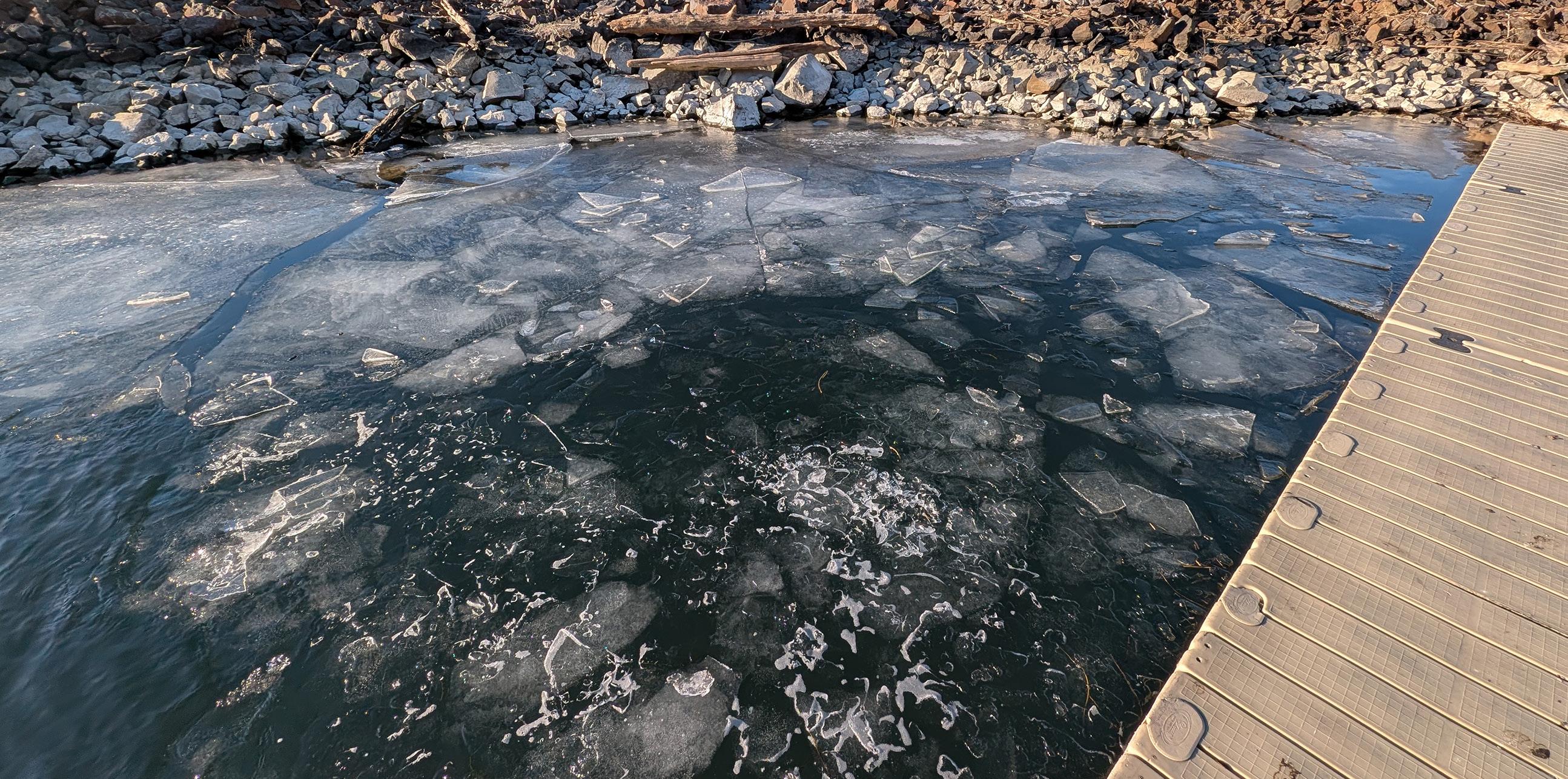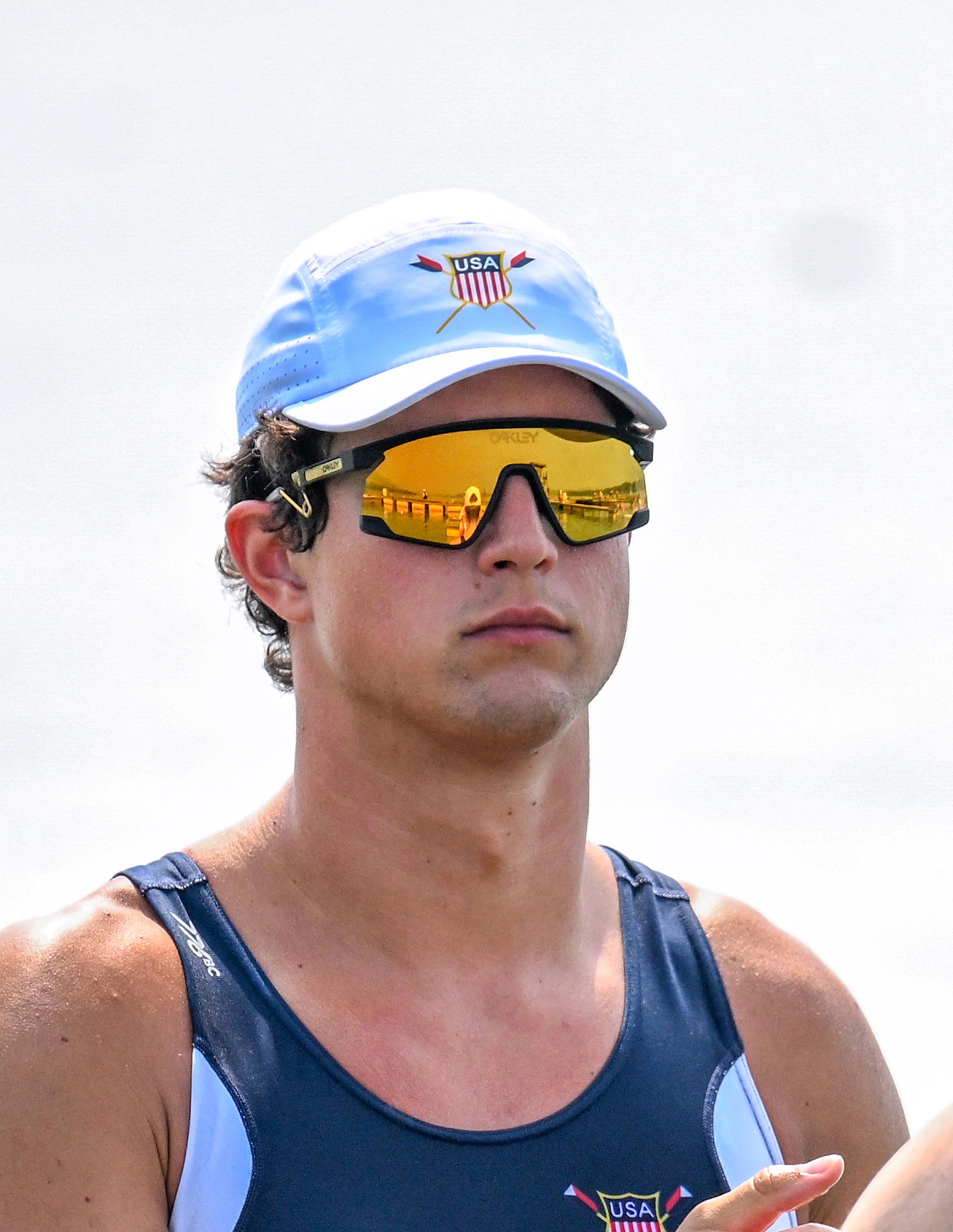

THE PULLHARD
A COUGAR CREW PUBLICATION
VOL 35 / NO 2 / SUMMER
Cedar Cunningham Prospecting for Gold
PULL HARD
EDITORIAL TEAM
Editor: Rich Ray (80)
Design and layout: Kathleen Randall (81)
Writing and copy editing: Kari Ranten (80)
Research, writing and fact checking: Mike Klier (75)
Recent words of encouragement from Pull Hard readers are real recompense for occasionally tedious hours trotting editorial hamster wheels. With teamwork, everything is possible. Thank you, Summer 25 magazine crew!
Lynda Alvarez
Larry Arcia
Jeff Aselin
Jim Austin
Peter Brevick
Tammy Crawford
Cedar Cunningham
Anna Cummins
Andi Day
Dave Emigh
Doug Engle
Paul Enquist
Roger Holcombe
John Holtman
Karl Huhta
Alice Iseminger
Ernie Iseminger
Anne Jozaitis-Hole
Maureen Kelley
Finley Luther
Andy Moore
Scott Morgan
Kristi Norelius
Jean Patterson
Bert Player
Sarah Popowicz
Kari Ranten
Steve Ranten
Tim Richards
Martha Sleeper
Peg Staeheli
Ken Struckmeyer
Joe Sudar
Mitch Williams
COVER: JUNE 13, 2025, WORLD ROWING CUP 1, VARESE, ITALY. CEDAR CUNNINGHAM (22) AT THE STARTING PLATFORM, OPENING HEAT, M2X. PHOTO: USROWING/JULIA KOWACIC
Flipping through The New Yorker of December 9, 2024, I noticed a profile of Yale professor of philosophy and cognitive science, Laurie Ann Paul. Her book Transformative Experience (Oxford University Press, 2014) rang like a Chinese gong through the hallowed halls of academic Philosophy. This paragraph sucked me down the rabbit hole:
Transformative Experience attempts to examine the special types of situations that change not only what we know but also who we are. These transformative experiences provide new knowledge that previously would have been inaccessible to us, and with that knowledge our preferences, values, and self-conception are fundamentally altered.
I have puzzled for decades over the impact that four accidental years on the Snake had on the balance of my life. Those four years might be a case history in Professor Paul’s book. Know anyone who says they majored in rowing? I know two. Both highly successful, both unscathed by a youthful shift in priorities that would reduce most parents to weeping and gnashing of teeth. The intensity of emotion surrounding our sport is baffling. Is this some sort of cult? Why such solemn seriousness about minute technical issues in a sport unknown to the public, practiced by few, in the greater scheme of things, inconsequential?
Professor Paul has answers for these and similarly awkward questions. Framed by the philosophical sub-discipline Decision Theory, Transformative Experience explores ideas I have mostly looked at through the soft-focus lens of gut-level intuition. Paul shows why we needn’t be embarrassed because something we got into just for the fun of it changed who we are and how we understand ourselves.
In this issue you will find thoughts from our new Chair/President Doug Engle; racing reports from Varese, Italy and Lucerne, Switzerland; seasoned coach and rowing veteran Karl Huhta’s appraisal of our season-opener at Dexter Lake in Oregon. That’s for starters. You’ll also find Coach Brevick’s Perspective and Dave Emigh’s Observations, both winnowing the wheat from the chaff of racing season 2025; a simmering potpourri of alumni updates; some useful announcements; plus a meditative last thoughts chat with an LWRC oar who medaled in Tokyo in 1964. And don’t forget to scan the FY 2024-2025 roster of contributors. Comments, corrections, story suggestions: editor@cougarcrew.com.
—Rich “Flip” Ray (80)
Comments From the Chair
I am happy to accept the post of Chair of CCAA. Our previous chairs, Tim Richards and Andi Day, have pushed us forward by building a stable organization with an effective committee structure. After many years of discussion, we have taken the next big step by forming a 501(c)(3) tax-exempt corporation to further formalize and complement our relationship with the WSU Foundation. This move comes at the encouragement of the Foundation; a frank acknowledgement that the largest, most complex tasks may be better handled outside the university system.
Strategic Plan—our keystone
The core vision of the team’s Strategic Plan: …an excellent athletic experience for men and women, rowing in the halls of the cathedral that is the Snake River. Throughout trials and tribulations, the team has survived and thrived because of our core values of pulling ourselves up by our bootstraps, making the best of what we have, and being constantly in pursuit of excellence, no matter how long or how hard that road may be.
When I started rowing in the fall of 1975, several founding members were still with the team. They brought a sense of mission and a can-do attitude echoed in our mission statement.
During our first year (1971), the shellhouse was designed and built by the team. Nobody got to row. The only satisfaction was the power of collective action—the heart and soul of the rowing experience. Those early sacrifices allowed the rest of us to feel the rush of our bodies in motion, synchronized with our teammates— that otherworldly, almost indescribable sensation when you are integral to a whole that is more than the sum of its parts.
My experience was vastly benefited by two coaches, Ken Struckmeyer and Dave Emigh. Having a committed multi-year
MARK YOUR CALENDARS!
Cougar Crew Days: March 20–22, 2026
In April, Cougs brought the WIRA Team Points Trophy back to Pullman for the first time since Coach Arthur Ericsson and the team’s breathtaking 2010 Trifecta: winning the Heavy 8+, the Light 8+ and the Team Trophy. Cougar Crew Days 2026 will honor our WIRA Champs, then and now. Were you on one of these squads? Do not miss it.
coaching staff made the program feel stable and permanent—no easy thing to come by in collegiate club rowing programs. Few can afford (much less be willing) to commit to years of service coaching a program with little financial support.
Great leap forward
Transitioning to a paid, professional coaching staff has been the greatest single accomplishment of Cougar Crew alumni and supporters. We now enjoy a staff of one Head and one Assistant Coach, both fairly-compensated, in addition to one Graduate Assistant coach (whose grad school tuition and fees are in-kind compensation).
The collective willpower of our Power 10 members has made a permanent coaching staff possible. New alumni often start at $10 per month, a significant contribution over the course of a year. A number of us have moved to $84/month, a salute to 1984 Olympic medalists Enquist and Norelius. Some are shifting to $164/month, an annual gift of $1,970 and a thumbs-up to our founders from 1970. Our current active list of alumni and friends numbers 1,800 names. When just 200 of us commits to either level, doubling our salaried coaching staff will be a reasonable option. I strongly encourage you to become a Power 10 member or bump up your support. Our strength is in our numbers. Time to rally together!
—Doug Engle (79)
Doug Engle (79) has been critical to decades of alumni efforts on behalf of the team. Retired after 34 years as Federal Research Scientist at the USDA Western Wheat Quality Lab in Pullman. Long CCAA’s Financial Advisor, in March elected Chair and will be the first President of our newly-formed 501(c)(3).
Please join us in honoring these landmark achievements and those who made them happen. Mark your calendars and round up your crew! The Alumni Row is no longer catchas-catch-can. Crews organize early; lineups are no longer like musical chairs. Banquet keynote speaker will be an 11-time Pac-10 Coach of the Year; four-time Olympic/ National team coach; member of the National Rowing Foundation and Collegiate Rowing Coaches Association Halls of Fame. Bob Ernst coached men and women at the UW for over forty years and, coincidentally, married
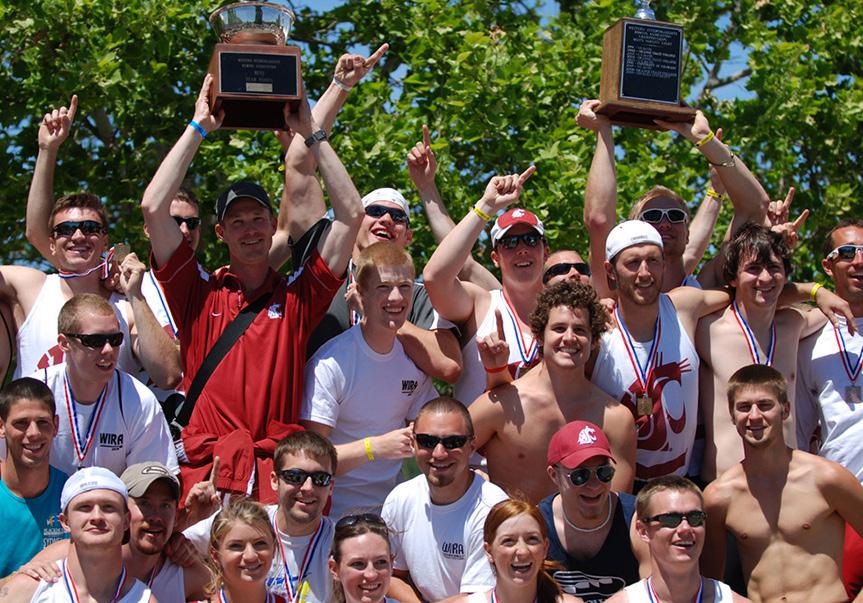
breadth of his experience and perspective will be eye-opening.
Coug oar Ellen Pottmeyer. Ernst cuts a monumental profile in regional, national and international rowing. The unparalleled
2010 WIRAs
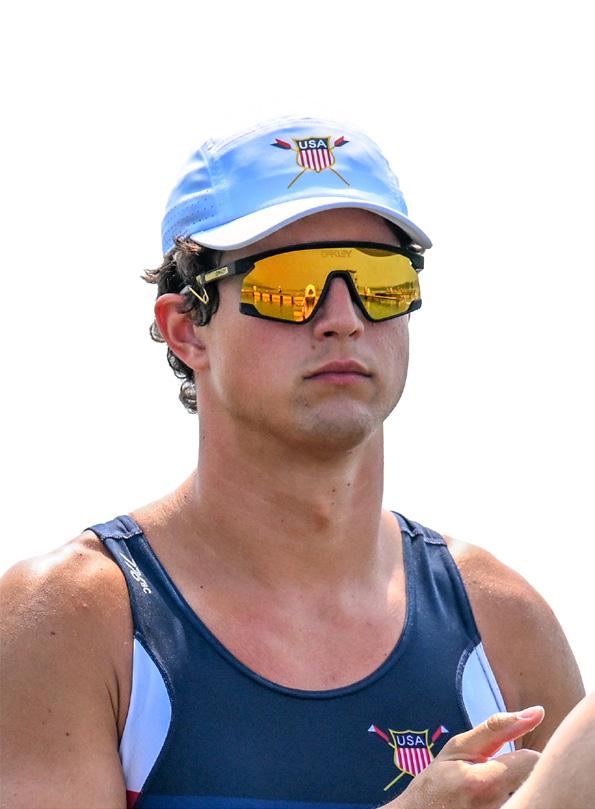
WSU’s Cedar Cunningham is prospecting for gold
Odds are, he’s going to find some
After debuting on the world rowing stage with gusto, Cedar Cunningham (22) returns from Italy and Switzerland with a bronze medal on his chest—solid progress toward his North Star: the Los Angeles Games and a place on the 2028 US Olympic team. Climbing relentlessly since leaving Pullman, he will not be resting on these laurels. Following graduation in 2022, he spent a year with the pre-elite program at Penn AC in Philadelphia. His work in Philly did not go unnoticed. Early in 2024, Cedar was invited to relocate to the USRowing national development facility in Sarasota, FL. Under the direct supervision and training of national team coaches, he has since navigated a punishing series of selection camps, trials races and ergometer testing. Only five seasons past learning on a Concept2 at the nadir of the pandemic, Cunningham has now sampled some pretty rare appetizers: 2025 Rowing World Cups 1 and 2. Already medaling? The flavor must be exquisite.
The remote keynote
March 15, he delivered a spine-tingling remote keynote address at Cougar Crew Days (link below). The following weekend, Cedar rowed in the Winter Speed Order Trials, conveniently on his training ground: Nathan Benderson Park in Sarasota. His results were apparently satisfactory, because they produced an invitation to the Olympic Event Selection Camp, May 11 through June 1, also in Sarasota. His Selection Camp results delivered another invitation, this time to join the national team. Cedar texted: “It is a great honor to go out on the world stage and represent our country. I feel great pride in giving back by earning medals and, hopefully, inspiring the next generation. I look forward to doing just that. It is addicting.”
Through this intense period of tryouts and scrutiny, Cunningham identified training load as his biggest challenge. “You have
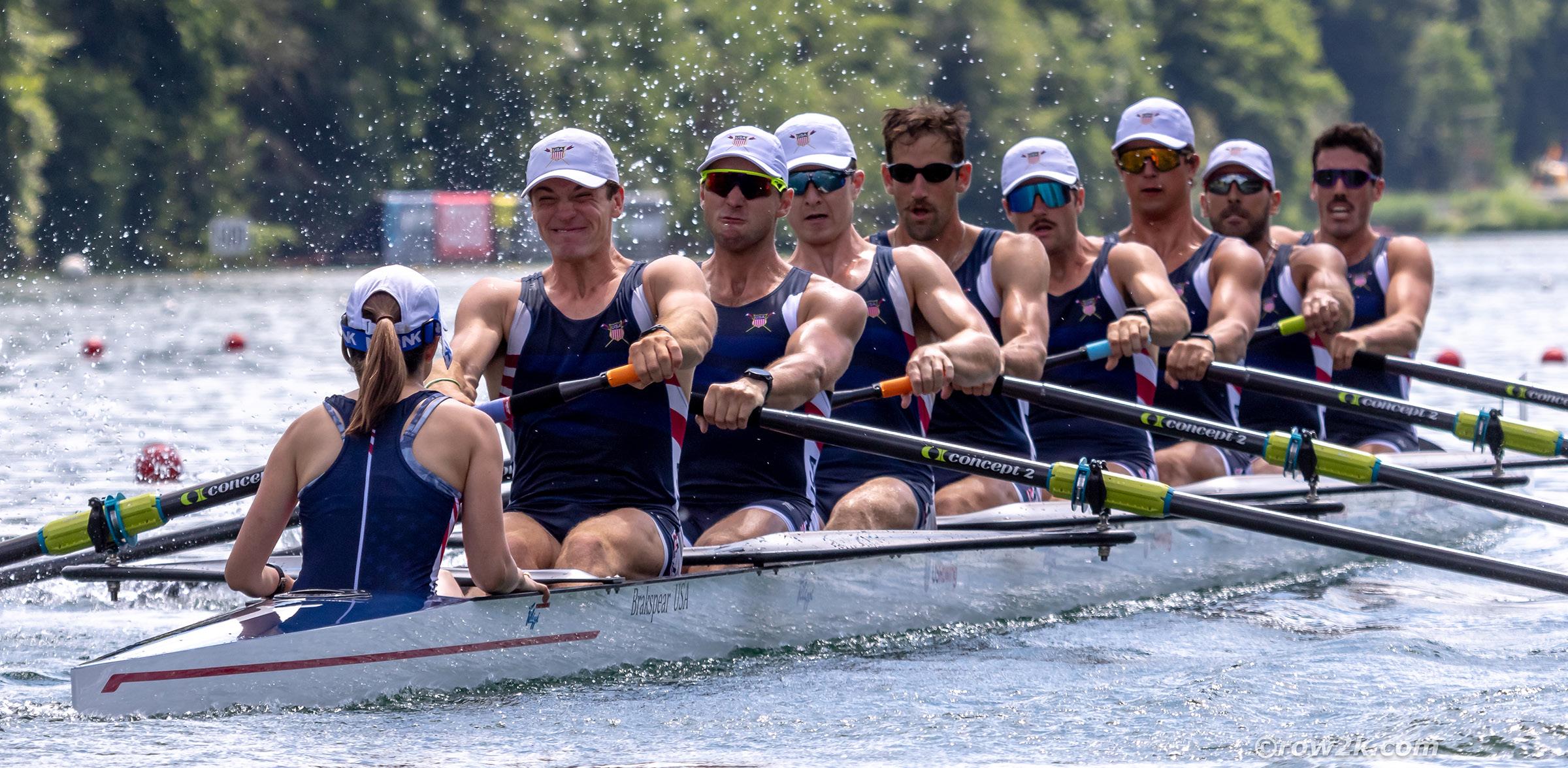
JUNE 29, LUCERNE, SWITZERLAND: GRAND FINAL OF THE MEN’S 8+. L-R CAROLINE RICKSEN (STANFORD), JACOB HUDGINS (DARTMOUTH), CHRIS CARLSON (OLYMPIAN, UW), ANDREW LEROUX (PRINCETON), JACOB PLIHAL (OLYMPIAN, NORTHEASTERN), JOSH DIGGONS (DREXEL), CEDAR CUNNINGHAM (WSU), CHRISTIAN TABASH (OLYMPIAN, HARVARD), GUS RODRIGUEZ (BROWN). FINISH TIME: 5:34.43. PHOTO: USROWING/ ROW2K.
two race days a week. You are expected to perform at your peak,” he said. “Typically, you are at your best after a taper, meaning a few lighter sessions, or at least an afternoon taking it easy. However, at camp you are at full volume, full weightlifting schedule, and pushing your limits each day to prove your worth. That makes it more difficult to perform your best on race day.” Asked whether any of this reminds him of his Wawawai days, Cedar said: “Like everyone says, rowing doesn’t get easier, you just get faster. Two-a-days, back-to-back Granite Point races, the fierce competition on the ergs. The competitive atmosphere on the Snake is no different than here at camp.”
While he enjoys both scull and sweep rowing, sculling has been Cunningham’s strength and focus since Pullman. “I have developed a great sculling technique. Lucky for me the switch back from sculling to sweep is a little more natural. While the stroke is the same, I’m still working on the small details of body positioning and handle work in my sweeping.” As ever, coaching is key. “Casey Galvanek is the men’s head coach and Josy Verdonkschot is the high-performance director. Casey is the coach and Josy assists in the decision making. There is a third-party selector who ensures fairness and puts the stamp of approval on selection decisions. Casey is also my coach in Sarasota, and I find him a great coach. He allows his athletes to be adults and gives autonomy, while being very demanding on perfecting the proper stroke and completing training correctly. It’s a great balance.”
World Rowing Cup 1 in Varese, Italy yielded Cunningham’s first taste of international competition, racing in the Men’s Double and the Mixed Eight. The mixed eight was billed as a “test race” because it has yet to make the official list of events at the World Cup or the Olympics. This is the second time the event has occurred at the international level, and organizers plan to have the first official race for the new category in the World Rowing Championships in September in Shanghai, China. Cedar and his teammates won the race, photo finish ahead of Germany. Since it was a test and only a test, no medals were struck, no medals were awarded.
The quad in Switzerland was a highlight for Cunningham. “In the opening heat, we had an idea of our capabilities, but we weren’t certain how we would stack up against the field. We were prepared to just race our race, do the best we can,” he said. “However, when we were up by a good margin off the start, and leading at the 250-meter mark, I knew we would get top two and qualify for the A Final. Our start was good, but I knew we had so much speed left that no one would stop us from qualifying.” The quad earned bronze in the A final.
Wash, rinse, repeat
The grueling intensity of the selection process, the tension and emotions Cunningham is experiencing, are familiar to a number of former Cougs who have attempted to make the national team. Paul Enquist (77) and Kristi Norelius (77) are the most noteworthy so far. Both earned gold medals at the 1984 Summer Olympic Games in LA: Enquist at stroke in the US Men’s 2x with partner Brad Lewis and Norelius in the six seat of the US Women’s 8+.
Enquist knows what this level of competition is about. In 1983,
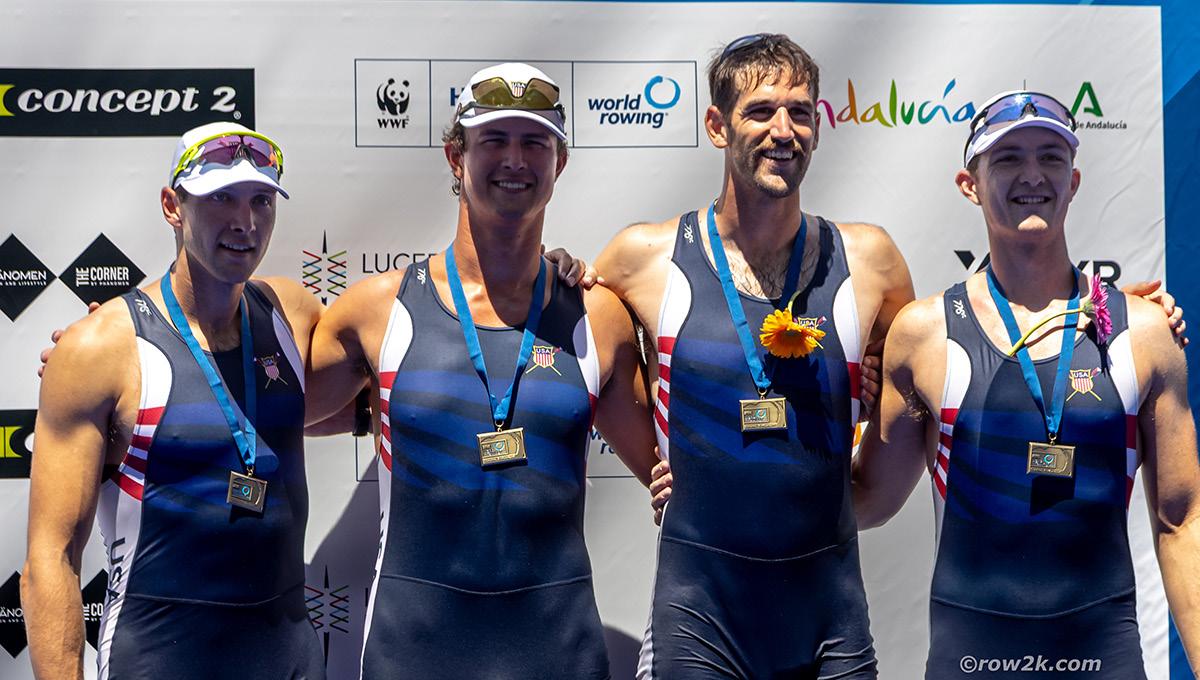
Enquist, Lewis and other hopefuls spent weeks in a pre-Trials US Sculling Team camp out of the Dartmouth boat house on the Connecticut River, under the sharp gaze of 50-year Harvard head coach Harry Parker (1935-2013). “You are always racing each other. Every piece is a race. You’re rowing with different people all the time and Parker was looking for the people who come out on top,” said Enquist. Afterwards, Enquist and Lewis raced in the trials at Princeton University in New Jersey and won, validating Parker’s choice to make them the US Men’s 2x entry in the 1983 World Rowing Championships in Duisberg, West Germany. Experience on the world stage, says Enquist, is key to developing and gaining confidence. “You’re going to the line against guys who have won world championships. Here you are, right in the middle of them. That’s intimidating… Experiencing it is really important. Cedar’s going through the washing machine, just like I did.”
Norelius did not consider herself an athlete when she arrived in Pullman. She learned to row on the Snake during two years with Cougar Crew, found she had a passion for the sport and advanced quickly with time in southern California, Lake Washington Rowing Club, and ultimately the University of Washington, where, in 1981, she earned a national title in the varsity eight. Still, she recalls seeing herself “as a kid on the fringes” at national team development camps; not in the same league as the icons she looked up to. “When I was invited to that Olympic Team selection camp, I found myself with a serious case of imposter syndrome. The selection process is a blur to me now, but I do remember a gradual evolution in which my confidence grew enough so I could see myself as someone
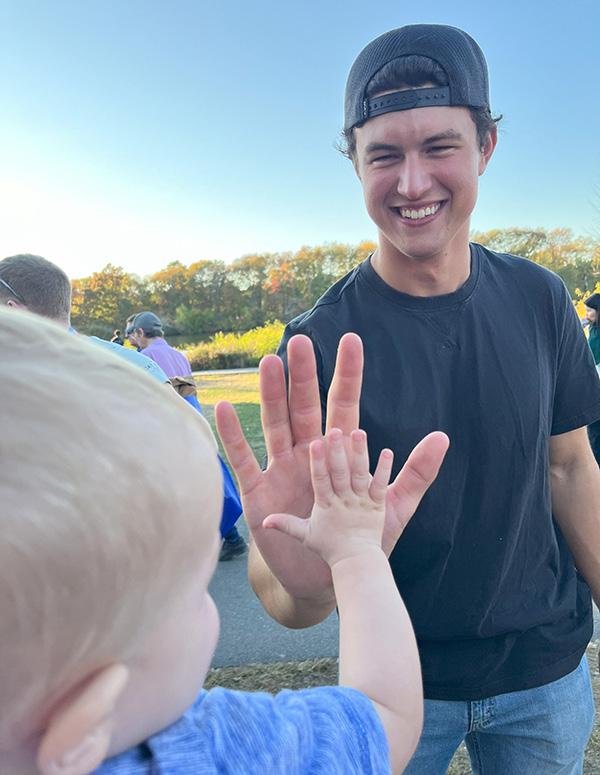
OCTOBER 18, 2024. HI-FIVING DANIEL CUMMINS AT THE HEAD OF THE CHARLES. DANIEL’S PARENTS BOB AND ANNA WERE CEDAR’S NEXT DOOR NEIGHBORS IN ISSAQUAH IN 2020 AND TAUGHT HIM THE BASICS ON THEIR ERGOMETER. PHOTO: ANNA CUMMINS.
JUNE 30, LUCERNE, SWITZERLAND. BRONZE MEDAL QUAD ON THE PODIUM. L-R: CHRIS CARLSON (OLYMPIAN, UW), CEDAR CUNNINGHAM (WSU), JACOB PLIHAL (OLYMPIAN, NORTHEASTERN), ANDREW LEROUX (PRINCETON). PHOTO: USROWING/ROW2K.
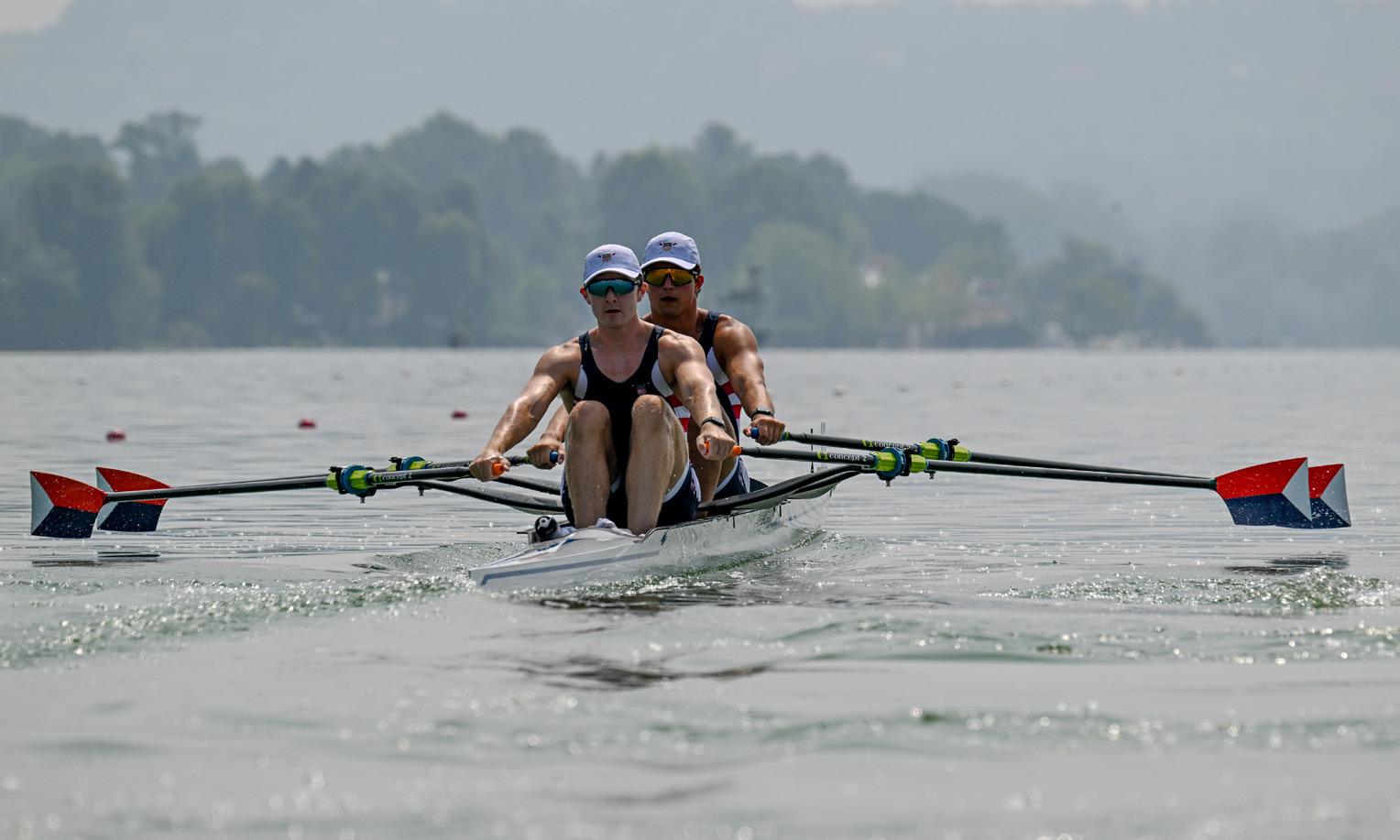
JUNE 13, WORLD ROWING CUP 1, VARESE, ITALY. US ENTRY IN HEAT 2 OF THE MENS 2X. L-R: ANDREW LEROUX (PRINCETON), CEDAR CUNNINGHAM (WSU). PHOTO: JULIA KOWACIC
who could someday, down the road, be a contributor. So when I saw my name on the Olympic roster, I was shocked, then filled with very guarded pride.”
Enquist and Cunningham talk occasionally; Enquist offering advice and encouragement. “He’s still got to fight for a spot on that world championship team,” said Enquist, who believes scull-
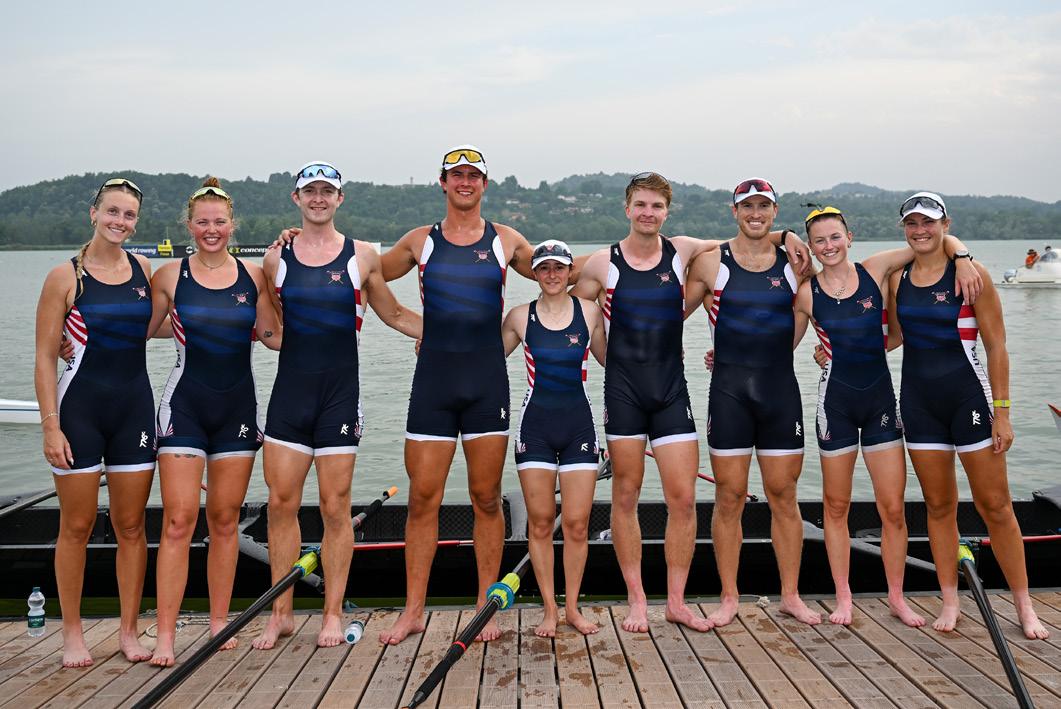
JUNE 14, WORLD ROWING CUP 1, VARESE, ITALY. MIXED 8+ TEST RACE WINNERS: L-R (STROKE–BOW): KAITLYN KYNAST (STANFORD), HOLLY DRAPP (UW), ANDREW LEROUX (PRINCETON), CEDAR CUNNINGHAM (WSU), CHRISTINA CASTAGNA (UW, OLYMPIAN, COX), CALEB NOLLENBERGER (MINNESOTA), MICHAEL HERMAN (UNIVERSITY OF SAN DIEGO), GRACE JOYCE (WISCONSIN), KATHERYN FLYNN (VIRGINIA). PHOTO: USROWING/ROW2K.
ing experience makes a stronger sweep rower. Crucial, according to Paul, is steering clear of the fatigue and drama that comes with frequent travel, unstable team dynamics and the minutiae of the selection process. “All you can do is try to avoid distraction. Keep your head down and work hard. Cedar will do fine.”
Norelius also emphasized hard work and credits Cunningham
If you’d like to join Team Cunningham, here is Cedar’s GoFundMe:

for wisdom, muscle memory and determination. “An important ingredient in the formula for the future is to remember the past. Cedar grew into a world-class rower because he knows that every day is an opportunity to work really hard and learn a little more. Just keep doing it. But don’t forget to press pause now and then. Look around and soak in the joy of this experience.”
The relentless schedule means it all goes by in the blink of an eye. Cunningham is working hard to stay focused on competing and improving but he’s not immune to the thrill of making it to the international stage. “You can easily get wrapped up in the new country, the different languages, different athletes,” he said. “I don’t let this affect my purpose, which is to race, and it becomes a wonderful experience. To compete at the highest level in our sport is an incredible honor.”
Olympic Events Selection Camp for the 2025 World Championships are underway as we write (July 6 to 27), with Trials racing scheduled for August 1-3 in West Windsor, New Jersey. The 2025 World Rowing Championships take place September 21-28 in Shanghai, China. After Shanghai, it’s back to training: Head of the Charles in October (2x with Michael Herman), high altitude training in Colorado Springs, CO, and Fall Speed Order Trials—all steps toward earning a seat on the US team at the 2026 World Rowing Championships in Amsterdam, NL, August 23-30, 2026.
—Kari Ranten (80)
Kari Buringrud Ranten (80) rowed 1976-80, serving two terms as commodore. A Murrow grad, she worked in daily newspapers for 20 years. Now retired as Regional VP of Communications at Skagit Regional Health. Married to Steve Ranten (79), Kari lives in Burlington, WA and has two grown children.
Editor’s Note: For background, see “Ergometer Man,” Jim Austin’s profile of Cedar in the Summer 2024 issue of The Pull Hard: https://tinyurl.com/54k7msdh. If you have National Team experience you’d like to share, email: editor@cougarcrew.com.
Cedar Cunningham in action: Cougar Crew Days 2025 Banquet Keynote: https://tinyurl.com/34dk34hd
Mixed 8+ Test Race, Varese: https://tinyurl.com/2znycraa Men’s Quad Final A, Lucerne: https://tinyurl.com/ynd4h3st Men’s 8+ Final A, Lucerne: https://tinyurl.com/hnrp49ah
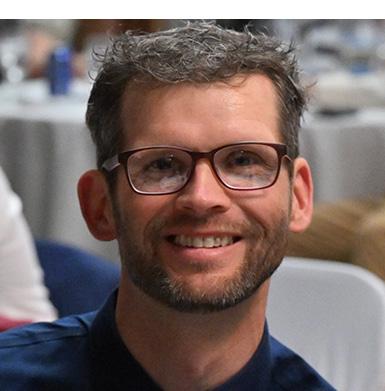
2025 Season from Peter’s Perspective
Encapsulating a rowing season in writing is a difficult task. In conversation I can sweep from the general to the specific, adjusting for different audiences, comfortable that I can’t cover everything. In writing, not so much. I’m torn between covering everything with little depth, versus pointing out the fun stuff and missing some important details. Alert to Hemingway’s caution that “The first draft of everything is shit,” below is my Short List of 20242025 highlights.
1. ROSTER SIZE. The big change was obvious on day one last fall. We started with 36 athletes. Twenty-nine male rowers, four coxswains, and three club women. We regularly fielded three eights and nearly filled the erg room with just the varsity squad. The size of that group was the foundation of what we accomplished.
2. INTRASQUAD COMPETITION. We have three fall head races on our schedule: Wawawai, Spokane and Seattle, but the critical racing is at home. Weekly “GP Heads” are contests between ever-changing lineups in singles, pairs, fours, and eights, from Granite Point to the shellhouse, approximately 3.7km. Rowing with different teammates each week, these races are exercises in “learning by doing,” as well as the basis for choosing lineups for Head of the Lake. With a larger roster contending for seats, we posted the best GP Head results I’ve seen so far. We marked new all-time records and more pair combinations than ever hit benchmark times. It’s a mistake to try to find some correlation between autumn small-boat performance and spring speed in eights. Nonetheless, everyone was encouraged by the measurable progress we felt and saw.
3. WINTER CAMP. Our week in Newport Beach, CA, was excellent. My heartfelt thanks for the encouragement and support from our alumni that made possible our first warm weather winter training in nearly 30 years.
4. COXSWAINS. For the first time in my tenure, we had multiple coxswains contending for multiple boats the entire season. Finley Luther (27), Natalia Swegle (25), and Sarah Popowicz (26) were game changers. All three have skill sets in navigation, power application and conservation of momentum—major assets for me and for the team. Great work, coxswains!
5. SENIORS. Evan Thornton set a new standard for improving on the erg, moving boats at the highest level, and leadership on and off the water. Natalia Swegle was always prepared and brought the best of herself to her role as coxswain. She also frequently
challenged, and beat, the rowers in training. Cooper Page dependably worked to improve his oarsmanship, and to lead the team and his boat, stroke seat to bow, in good rows (often) and bad rows (rare). Ezra Klinghoffer lived what training should look like (100+ mile bike rides for the fun of it), navigated injury with grace, set the bar for development from freshman fall to senior spring. Kyle Hole was the best boat mover on the starboard side, and he did a such a great job as Commodore I’m still a bit dazzled. Finally, Isaac Aselin was not the tallest, strongest, or fittest on the team, but his infectious, unavoidably positive energy made us all better people.
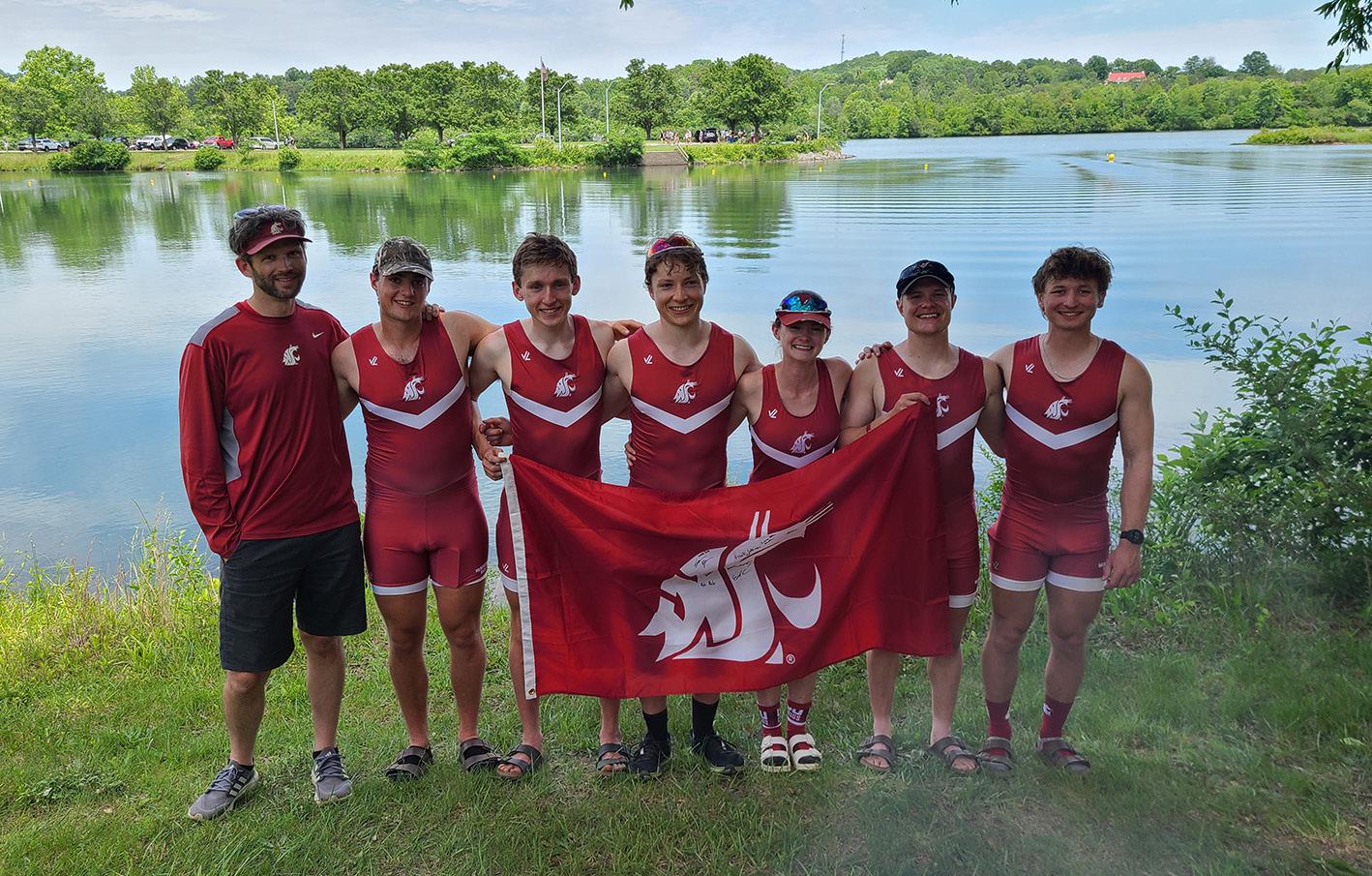
My appreciation for these six will be a lasting memory. All rowed four years except Natalia, a CC transfer with us just two. All earned seats in the Varsity 8+. Well rowed, well coxed, well raced.
Thank you, alumni and friends, for your generous support. You are making the real growth of this squad possible. Thanks also to our staff: volunteer assistants Hana Anderson (25), Jeremiah Lee (23), and Scott Morgan (75); grad assistant Kea Stieglitz (26), and assistant coach Bjorn Elliott (21). Your work with the students (and putting up with me) made this season happen. There is fresh energy and excitement on the team. Isaac expressed it well in the middle of a row last fall, shouting “I really wish I was a freshman right now, because you guys are going to be good!”
—Peter Brevick (06)
Peter Brevick (06) coached five years with the Oklahoma City Boathouse Foundation and the OKC Riversport Junior Program. In 2014, he coached the US Men’s Lightweight pair at the Worlds in Amsterdam, NL. Peter is beginning his eighth year as Head Coach and Program Director at WSU.
L-R: COACH BREVICK, EVAN THORNTON, KYLE HOLE, EZRA KLINGHOFFER, NATALIA SWEGLE, ISAAC ASELIN, COOPER PAGE. PHOTO: JEFF ASELIN.
Takin’ Care of Business
Cougs Stand Out at Dexter Lake
I arrived at Dexter Reservoir in Lowell, Oregon on the morning of Saturday, April 5. The first thing I saw was Ol’ Crimson proudly flying high. It was hard to miss. I had driven a shell trailer for another school to the Collegiate Covered Bridge Regatta. I arrived early to park the trailer before race day traffic arrived. On a 30-foot flagpole braced against a tree on the grassy hillside sloping down to the lake, the WSU flag was directly in the line of sight of everyone entering from the parking lot. Cougar shells on slings were staged close by. After watching the regatta, it struck me that Ol’ Crimson’s prominence seemed to set the tone. The Cougs traveled eight and a half hours southwest to take care of business. And that they certainly did.
The Covered Bridge Collegiate Regatta is sanctioned by US Rowing and sponsored and organized by the Oregon Association of Rowers, whose boat house is on the lake and serves as GHQ for several well-run and well-attended regattas. The course has a stake-boat start and is fully-bouyed over eight lanes that nestle between forested hillsides that (mostly) shelter regattas from ill winds. The Collegiate Covered Bridge Regatta is currently the clos-
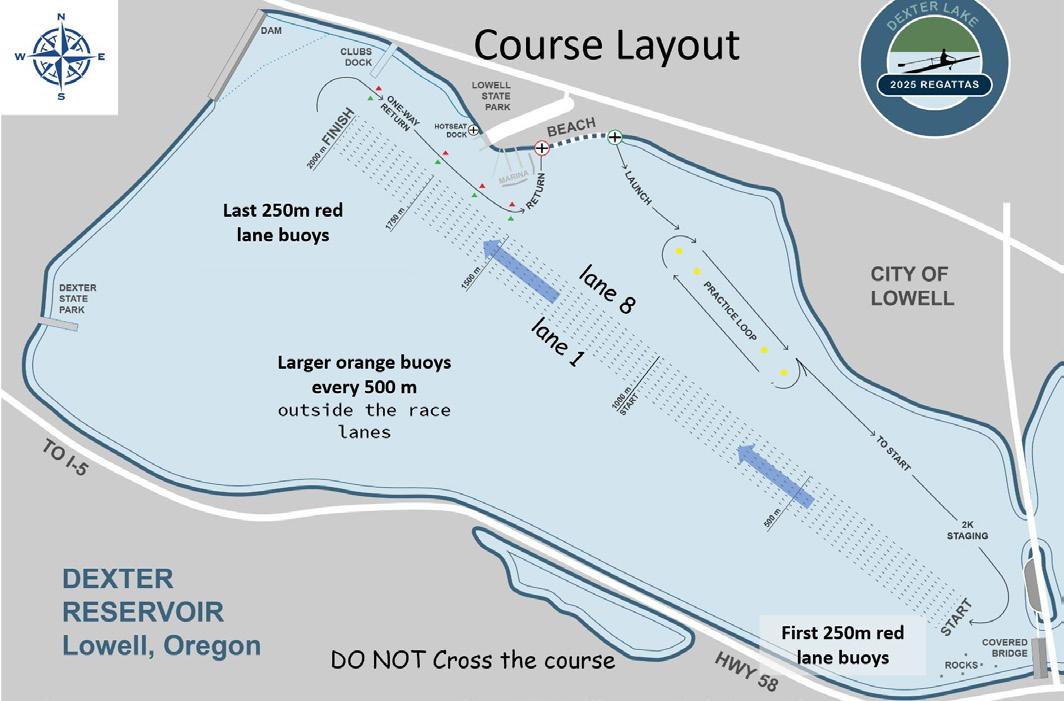
est thing we have to a regional contest. WSU displayed the best speed and depth of the ten teams on the water that day. Just three weeks later, for the first time since 2010, that depth was showcased when we earned the Team Points Championship at WIRAs.
But what left the strongest impression on me from Covered Bridge was not the decisive wins from the 1V8+ in the morning and afternoon sessions, nor the 1N8+ win posted in the morning session after a confusing and chaotic start to their race, nor the Women’s 2x defeating Oregon in some tight, competitive racing, nor the 2V8+’s open-water victory over UC Davis in the afternoon session (particularly exciting as rumor had it the Davis entry
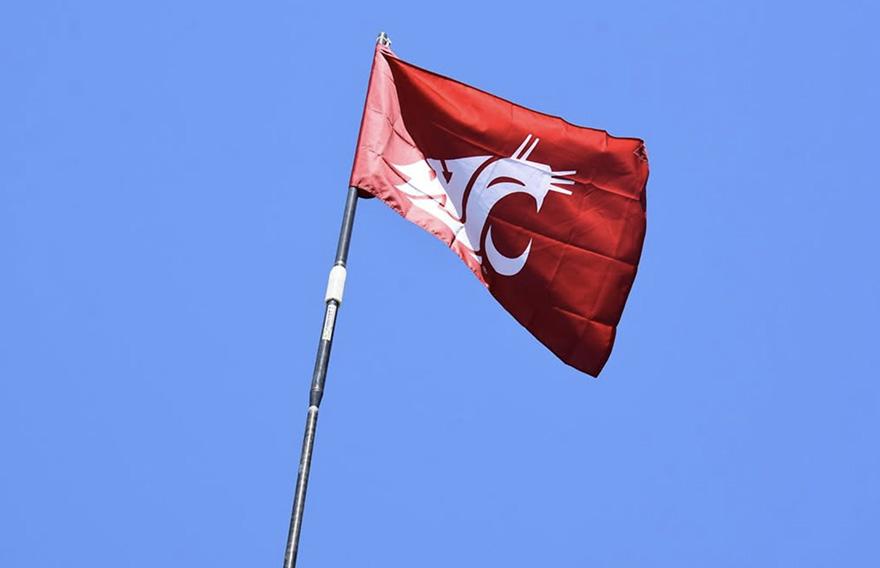
included some 1V8+ rowers). Individually, these moments were wonderful to absorb. But I also saw something that you can tell has been years in the making—the product of diligent thought, planning and practiced when no one is watching. For lack of a better term, I witnessed what I would call the process of success coming to life. That process is what made these moments possible. That is what stood out for me.
To what process do I refer? In short, the little things that make the big things happen. Asked by a fellow alum what stood out as I watched, I responded I was most proud to witness the professionalism of the student-athletes and coaching staff. This was the first time in several years I have seen Cougar Crew in competition. What I watched was the efficiency of a well-oiled machine, smoothly executing many small, essential operations.
Tents that sheltered the student-athletes as they relaxed between races or prepared for their next row were neat and well-organized. The rhythmic whir of ergometers signaled warm-ups before races or just staying loose between races. Crew members, anywhere on the regatta site, looked like a true team. It’s a small detail, but I loved seeing student-athletes and coaches in WSU gear of white, crimson, gray, and black. Most other squads arrived on site dressed in miscellaneous workout gear and were identifiable as a team only once they were boated. The sharp look was not the only contrast that was startling. Other teams in one instance were engaged in a dance battle against each other around their boat trailers while the Cougs were focused on preparing to compete.
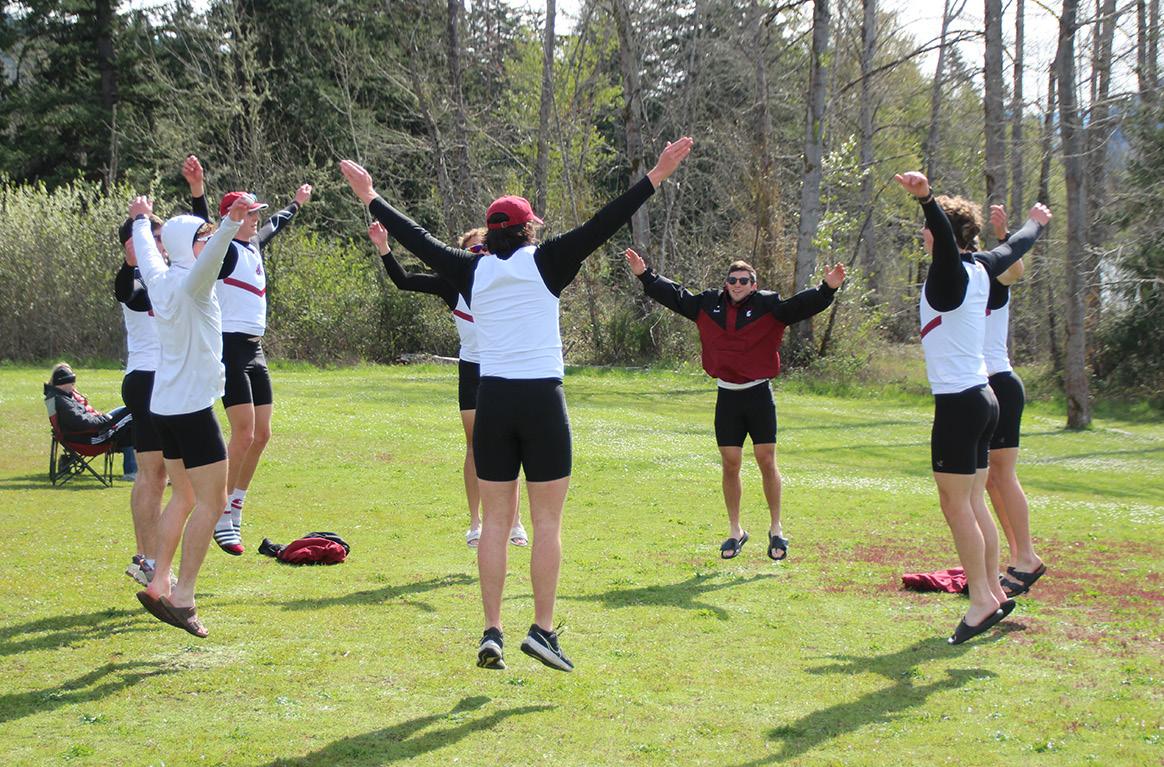
APRIL 5, 2025. DEXTER RESERVOIR, LOWELL, OR. M1V8+ DOING THE APTLY NAMED WORLD’S GREATEST WARMUP BEFORE THEIR FIRST RACE OF THE DAY, A SIX-SECOND WIN OVER UC DAVIS. L-R: TREY AQUINO, COOPER PAGE, FINNLEY YOUNG, DYLAN REEVES, EVAN THORNTON, ZACK BRANDT, FRANK CODDINGTON, KYLE HOLE. PHOTO: SARAH POPOWICZ.
I can see Head Coach Peter Brevick’s idea of success is not a simple one, and the small things that impressed me are some of the building blocks he uses to make big things happen. Our results at Covered Bridge were, at least partly, the end result of his patient, dedicated assembly of these blocks. Between each race, lineup switches were made. Coaches were constantly tinkering, always looking for the edge and for whom on the team will step up to the occasion to show they can impact boat speed in a positive way. A thoughtful, professional approach to race day.
Shoutout to the Varsity 4+ that raced Western Washington’s M1V8+ broken into two fours (WWU did not enter a V8+). Additionally, they raced Oregon’s top four athletes, also rowing the event. Kudos to the crews on how they handled a challenging cross headwind and boat wakes in the afternoon. I loved the excitement on the faces of the 1N8+ after winning their morning race. Although the start of their race was confusing due to officials starting the race before all crews were backed into the stakeboats, it was the first taste of spring racing victory. A success they will remember for years to come.
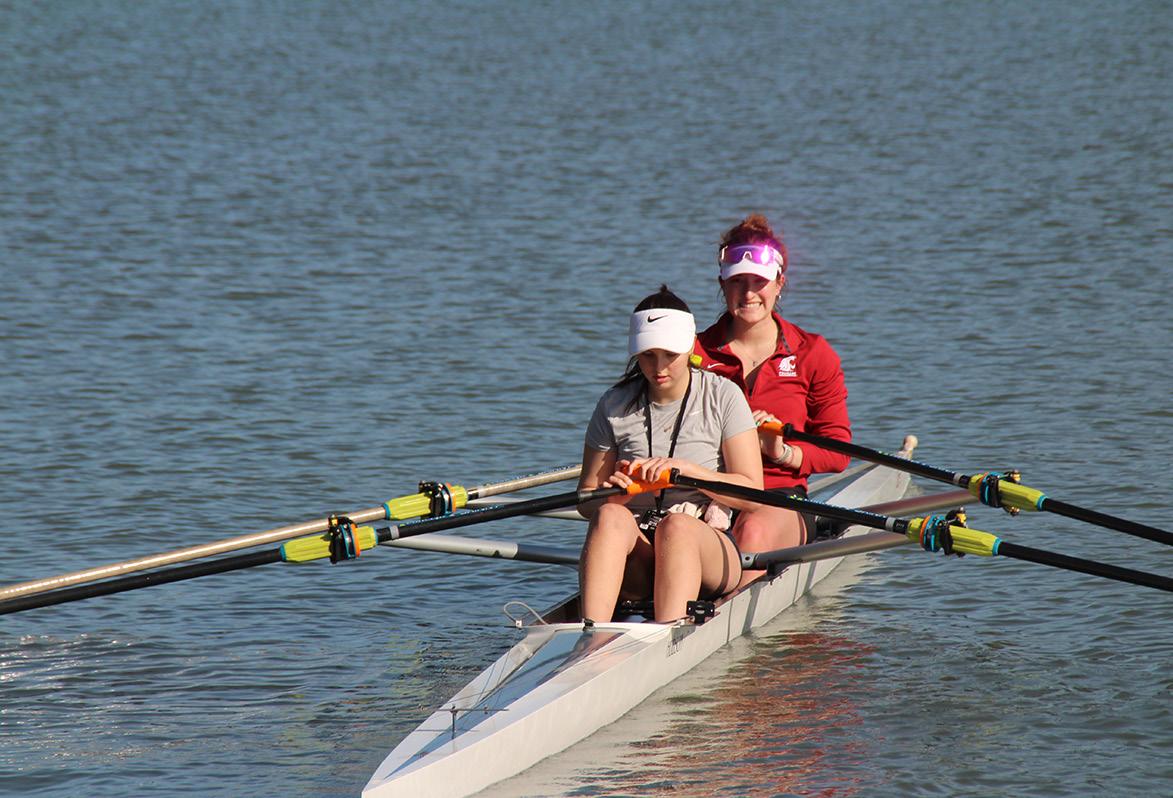
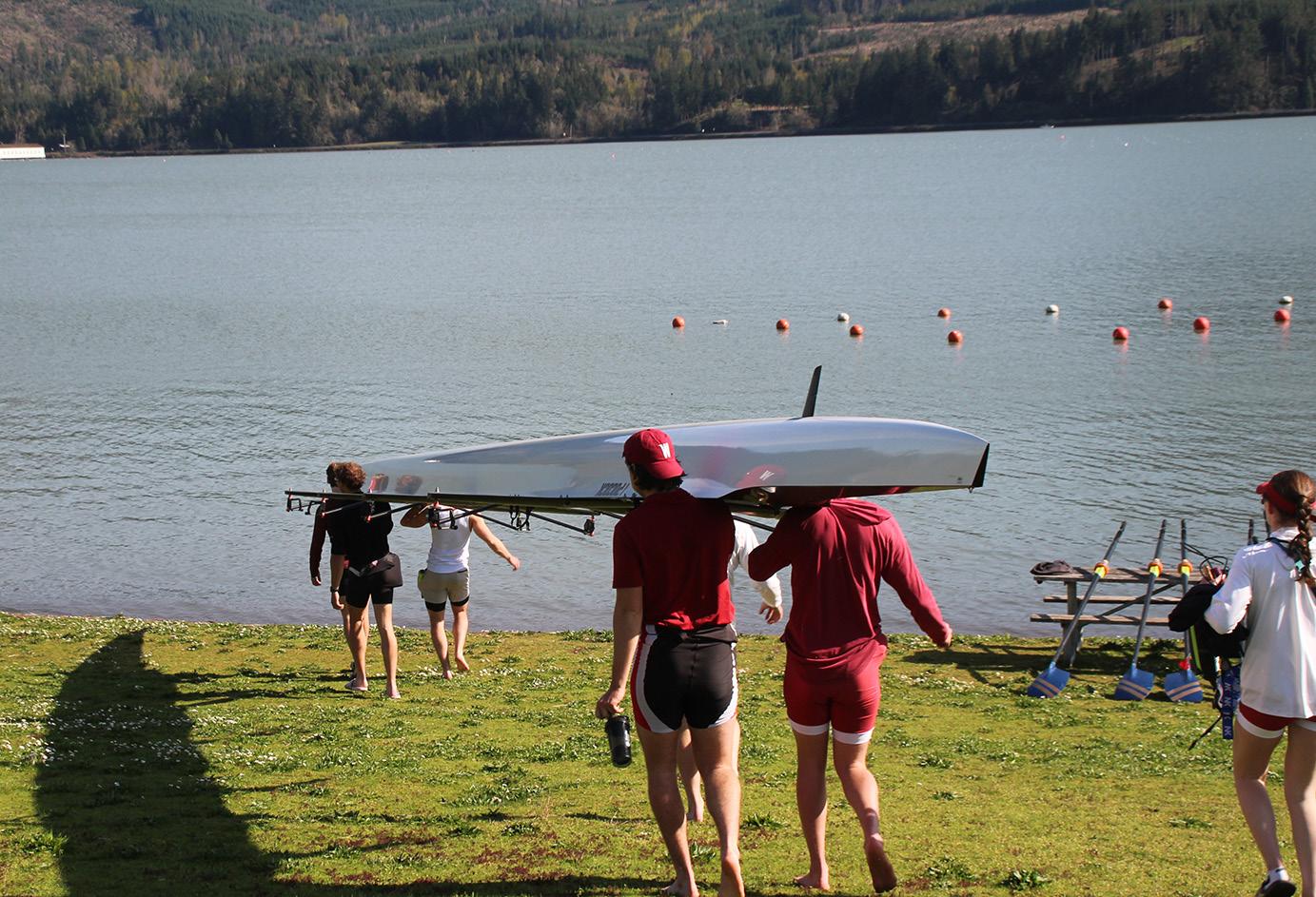
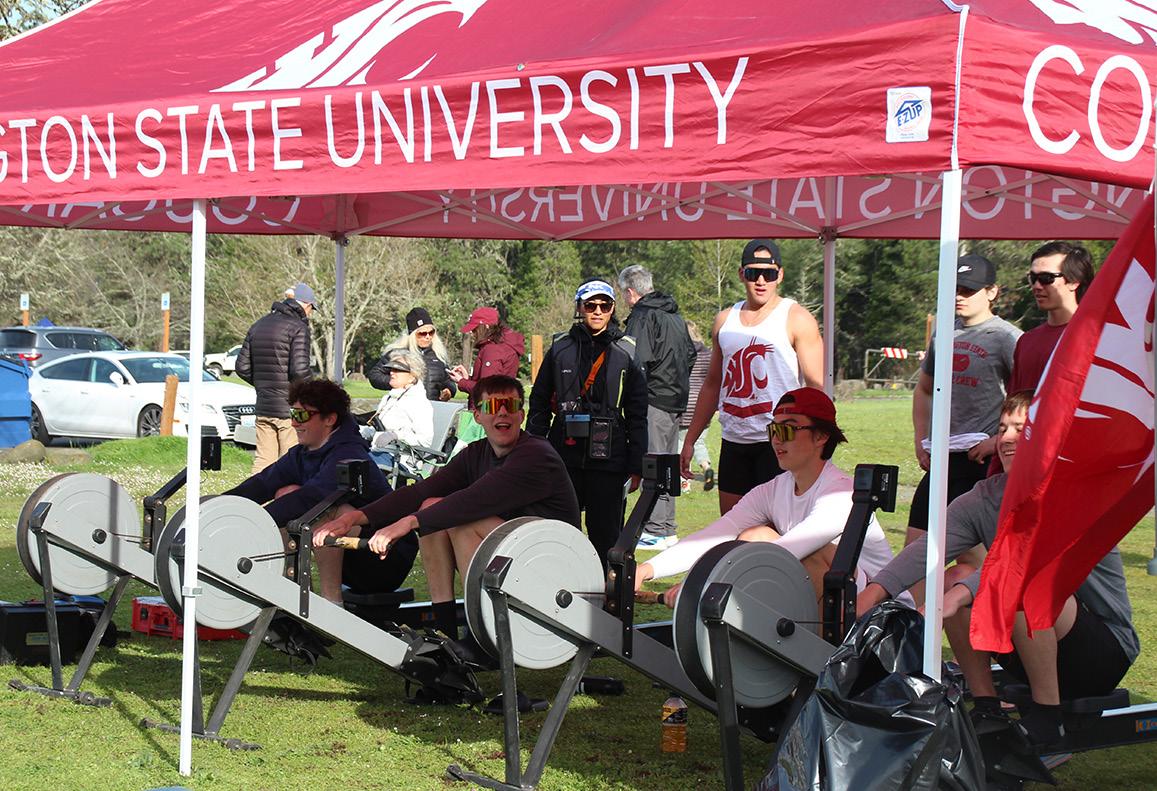
I was also struck by an absence of complacency. In the postrace discussion reviewing their morning performance, one of the athletes in the M1V8+ suggested they were (I paraphrase) “eight people trying to individually row a boat,” when their objective is moving and flowing together as a unit. “We must move away from the video game mentality,” Coach Brevick said to me. “If the race doesn’t go the way we wanted it to, we do not have the luxury of pressing restart and getting to try again. We must make our first chance count as if it is our only chance. Every time.”
The Collegiate Covered Bridge Regatta was a solid start to our 2025 spring racing season. I left the regatta excited by the potential of this year’s team because I witnessed a focus on doing the little things at an exceptionally high level. I could see the details being looked after. More important, I saw that those details are embraced by the student-athletes—a basis for long-term success. With that solid foundation coupled with consistent effort, the goals set by the team will take care of themselves.
—Karl Huhta (08)
Karl Huhta rowed for Cougar Crew 2004 to 2008 and held three different officer positions, including Commodore his senior year. He coached Division-1 rowing for 14 years at four different universities. In March, Karl was elected Alumni Representative on the Cougar Crew Alumni Association board.
Collegiate Results: https://tinyurl.com/ymysd2r9
APRIL 4, 2025. DEXTER RESERVOIR, LOWELL, OR. W2X HEAD OUT FOR THEIR FRIDAY PRACTICE ROW. SATURDAY THEY RACED TWICE, FINISHING FIRST AND THIRD. L-R: ANGELA YATSKO, MAILE RYAN. PHOTO: SARAH POPOWICZ.
APRIL 5, 2025. FIRST NOVICE 8+ WARMING UP BEFORE THEIR INITIAL CONTEST, WHERE THEY BESTED UC DAVIS BY 14 SECONDS. L-R: ZACH SCHULER, AUSTIN KOOLE, LYNDA ALVAREZ, KAINALU BARSANA-SZWCZYK, LOGAN DAVIS, JACKSON MACLEAN, OLEKSANDER MALTSEV, NATHAN FORD. PHOTO: SARAH POPOWICZ.
M1V8+ LAUNCHING FOR THE FRIDAY PRACTICE ROW. PHOTO: SARAH POPOWICZ.
The Regattas 2025 Dave Emigh’s observations
WSU’s 2025 Racing Season was about teamwork, speed, and sustained growth. This season I attended at least 12 training sessions, including some two-a-days. At the conclusion of each day’s practice, Coach Brevick always asked me to address the squad on a topic of my choice. The week before the Covered Bridge Regatta, my talk went something like this:
As I look around, I don’t see any bad rowers. If there were any, they already quit. Of course there is a perceived ‘rank order’ within the team. That rank has been established by erg and strength scores, and which boat you will be racing in. But I don’t
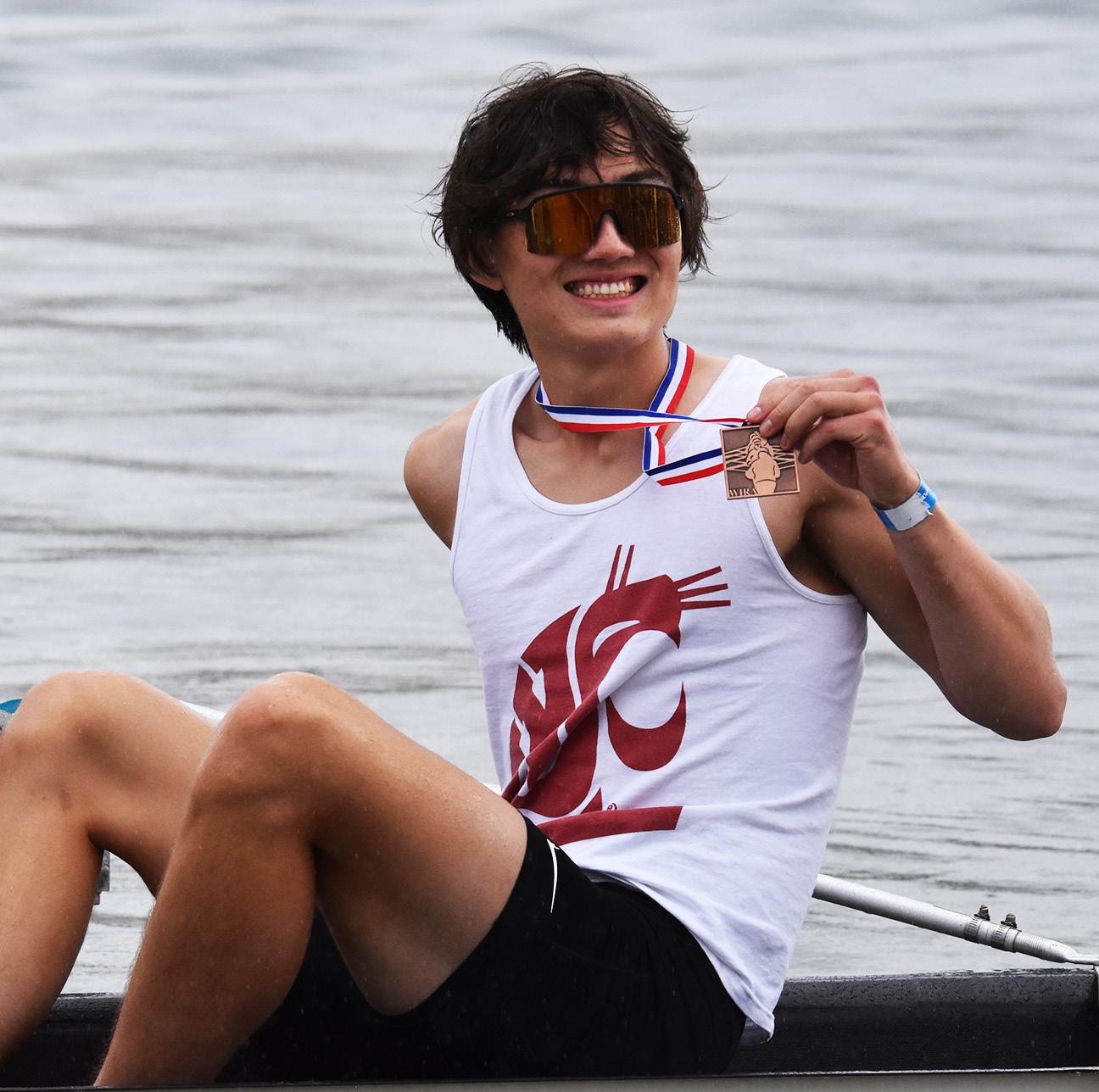
27,
IN THE GRAND FINAL OF THE MEN’S
see any bad rowers. What I see is a WSU Crew, where every man and woman is important. When you race, each of you will score points toward the ACRA All Points Standings. Use each race to build and prepare yourselves for a maximum performance at the end of the season. Race your hardest, work your way past the next boat ahead of you. No matter what boat you race in, you are important to the team!
Along their path to ACRAs, they won the WIRA All Points trophy. This wasn’t like a track or swim meet, where coaches try to align athletes and events to maximize team points. Commodore Kyle Hole: “We were all surprised
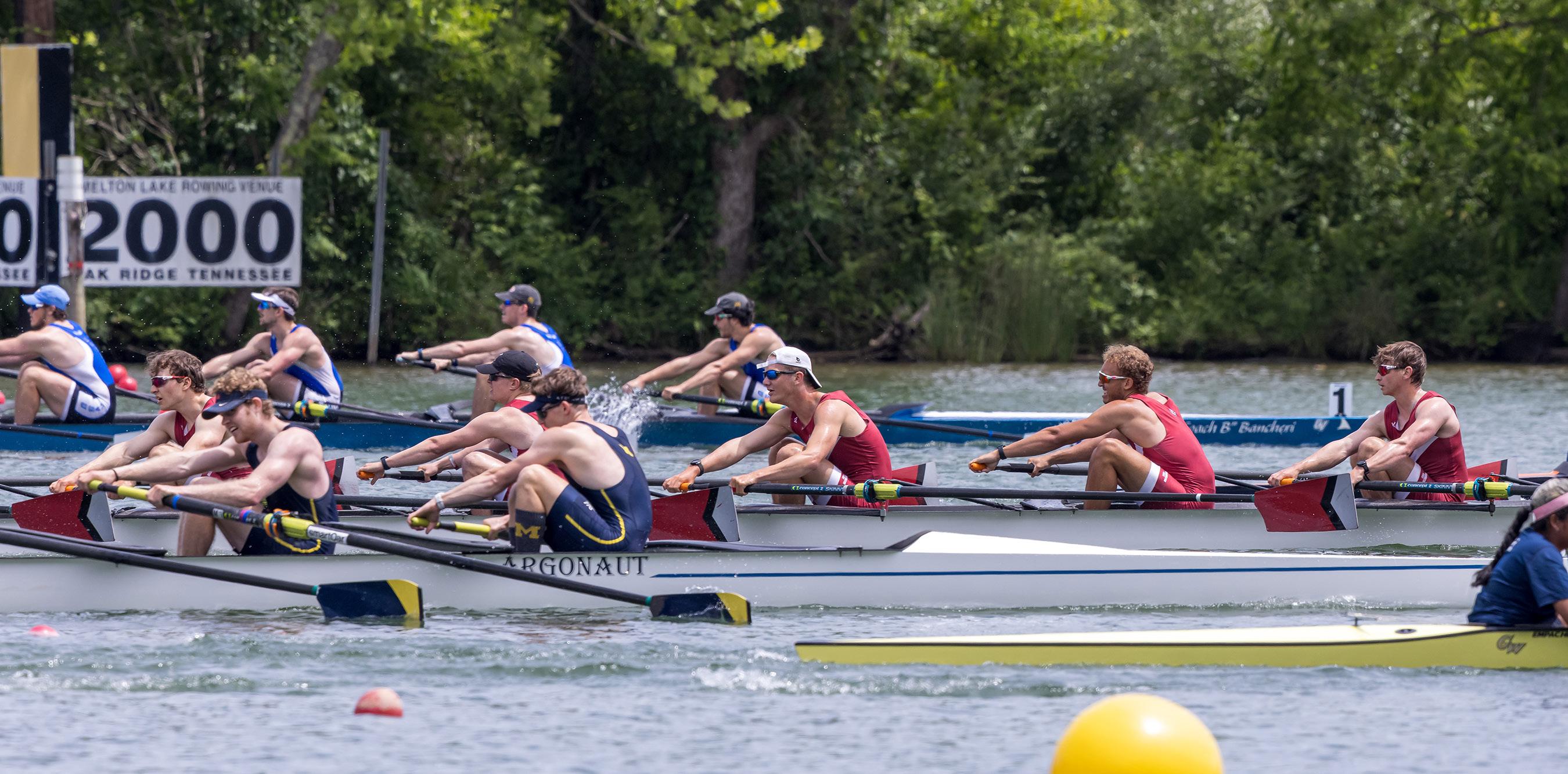
THE TAPE AT 6:01.124. LANE 3 (BUCKNELL) WAS SECOND AT 6:03.659, BOW DECK OVERLAPPING DELAWARE’S STERN DECK. LANE 6 (GEORGE WASHINGTON) TOOK THIRD ONE SECOND LATER AT 6:04.639. LANE 4 (WSU) WAS FOURTH, 1.597 SECONDS BEHIND GWU AT 6:06.236, FOLLOWED BY LANE 1 (GRAND VALLEY) UNDER HALF A SECOND LATER AT 6:06.281 AND LANE 5 (MICHIGAN) AT 6:07.001 (UNDER A SECOND). NO OPEN WATER VISIBLE BETWEEN FIRST AND SIXTH PLACE. BEGGING WILLIAM FAULKNER’S PARDON, WE PARAPHRASE LUSTER FROM THE SOUND AND THE FURY: THAT’S HOW QUALITY DOES. PHOTO: ROW2K.
APRIL
2025, WIRA CHAMPIONSHIPS, LAKE NATOMA, CA. STROKE LOGAN DAVIS FOLLOWING WSU’S BRONZE MEDAL FINISH
NOVICE 8+. PHOTO: ANNE JOZAITIS-HOLE.
when we were called to pick up the All Points trophy. We just went out and raced our races and, in the end, we were happy that we did enough to win the trophy.”
The elusive sub-six
Rowing under six minutes over 2,000 meters is often compared to distance runners and the magic of the four-minute mile. WSU has been on the verge for several years. In the WIRA finals, the M1v8+ rowed a 6:00.019. Stroke-oar Evan Thornton: “We were so close…if I had gotten a haircut we might have made it.”
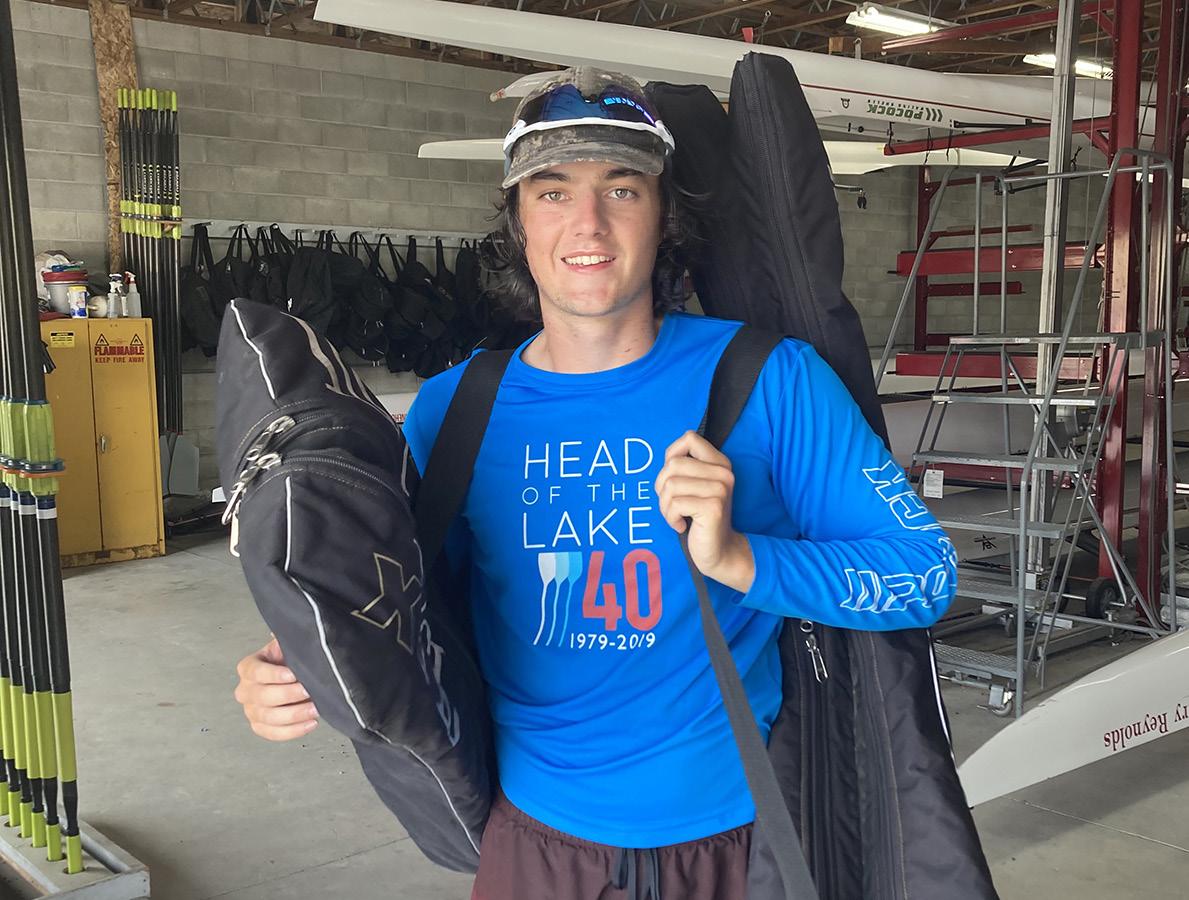
FRIDAY, MAY 10, 2025, KEN ABBEY SHELLHOUSE. M1V8+ STROKE EVAN THORNTON, WITH HIS DISASSEMBLED CARBON FIBER RIGGER COMPONENTS FROM THE MYRIC, MOMENTS BEFORE LOADING THEM ON THE TRAILER HEADED FOR ACRAS. ON MONDAY, THE TEAM MADE A FINAL ROW WITH AVAILABLE EQUIPMENT. TUESDAY, THEY DROVE TO SPOKANE FOR THE REDEYE TO KNOXVILLE. PHOTO: DAVE EMIGH.
In Friday afternoon heats at ACRA, WSU’s M1v8+ rowed a 5:56.4 on a certified championship racecourse. The heats were impressively fast, with 13 crews breaking 6:00.0. That is how competitive ACRA has become. Discussion inevitably followed about whether favorable conditions boosted results, but a crew must be fast in order to break six minutes. Was this the first WSU crew to do so? Apparently a comprehensive record of our results does not yet exist. If you know of other sub-six minute crews, please share. For now, ACRAs 2025 marks the first time a WSU crew has broken six minutes.
ACRA training week
The ACRA National Championships are three weeks after WIRA and two weeks after graduation. The week following graduation is in essence our ACRA Training Camp. Dorm residents moved in with team members living in houses or apartments. For a solid week the exclusive focus of the team is on improving technique individually and collectively. That week I saw the rowing and speed really improve. Teamwork and mutual support were visibly strengthened as well. Saturday morning workout is the end of the formal training season and then the trailer is loaded. The team trains during the few days remaining before the flight to Tennes-
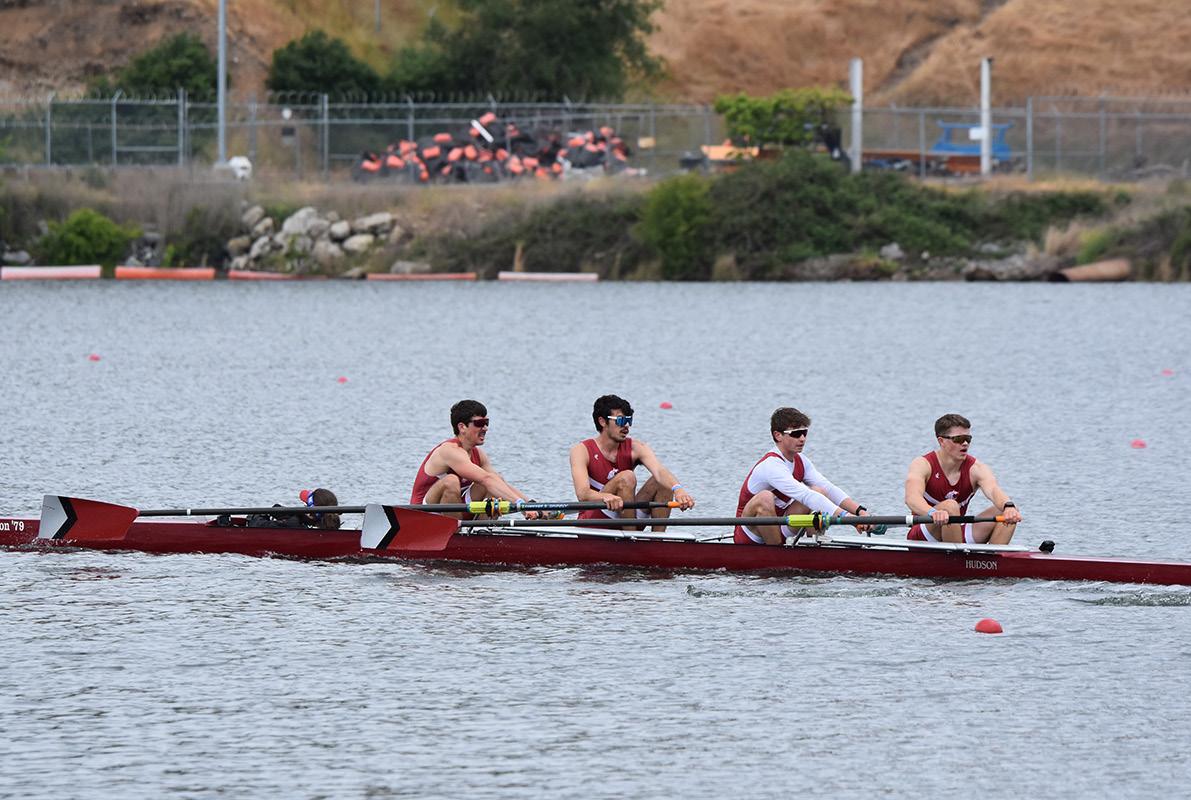
APRIL 27, 2025, WIRA CHAMPIONSHIPS, LAKE NATOMA, CA. CURVATURE OF THE EARTH. WSU’S MENS LIGHT 4+ CLOSING ON THE FINISH OF THE GRAND FINAL, 28 SECONDS AHEAD OF SECOND PLACE CAL BERKELEY. L-R: NATALIA SWEGLE, TREY AQUINO, ETHAN ALMARAZ, COOPER PAGE, AND AUSTIN COLE. PHOTO: ANNE JOZAITIS-HOLE.
see, but Coach Brevick is on the road with the fleet. Workouts are about sustaining peak fitness until that first preliminary heat. Following the morning race-pace pieces, the M1v8+, six of whom are seniors, requested a farewell row to Granite Point and back. As they faded into the distance, sophomore Owen Laub said “I’m sad for the seniors that this is their last row on the Snake. But I’m thankful that I have two more years of rowing here!”
—Dave Emigh (73)
Dave Emigh earned his BA in 1973 and his MS in 1979. He retired in 1994 as Program Director, Men’s and Women’s Rowing; and Head Coach, Men’s Rowing, at Oregon State University in Corvallis. Dave and spouse Jill reside in Walla Walla, WA, where they own and operate Shady Lawn Antiques.
Coug 2025 Results:
Covered Bridge (Row2k): https://shorturl.at/eIqMs GW Invite (CrewTimer): https://shorturl.at/DT5j1 Fawley Cup (Row2k): https://shorturl.at/7yzMr WIRAs (ClockCaster): https://clockcaster.com/e/63 ACRAs (HereNow): https://shorturl.at/pkGcW
CCD 2025 Palouse Reunion 2025
Full house, fine fare, fat purse
Despite some wintry weather, Cougar Crew Days 2025 did not disappoint. Nearly 270 alumni and guests joined the festivities and raised nearly $130,000. Per prior CCAA board decision, the funds offset van transport to practice, bus transport to regattas, equipment, air fare to the George Washington Invitational regatta in Washington, DC and reduction of rower expenses.
Some 225 attended the Friday evening Ice Breaker, catching up with friends and witnessing the annual Struckmeyer Award and Orr Trophy presentations. This year’s Icebreaker Surprise: Paul Enquist (77) and Washington State Magazine Associate Editor Adrianna Janovich outlined plans (underway) to collaborate on an autobiographical account of Paul’s remarkable journey from the Snake River to the 1984 Olympic Games in Los Angeles. Titled Unlikely Olympian, the book has been tentatively approved by WSU Press for publication prior to the 2028 Games, coincidentally again in LA. Reprising the 2024 group portrait to celebrate the restoration and installation of the David M Emigh in the Rec Center, the entire party gathered under and over the DME for another raucous, happy group shot. (See centerfold.)
Saturday rowing was preempted by high winds and snow. Pivoting nimbly, organizers summoned all guests back to the Rec Center, where a warm, festive atmosphere compensated (well, almost!) for the loss of water time. A hearty shout-out to Charise Pruitt-Law for some high-concept catering via “Crew Brew and Pastries.”
The Saturday banquet drew nearly 270 to Beasley Coliseum. The program opened with the dedication of the Kirk H. Schulz racing eight. The audience was rivetted by this year’s remote keynote presentation by Cedar Cunningham, a 2022 grad who has zoomed onto the national rowing stage. He also Zoomed onto the three big screens in Beasley from his homebase at the National Rowing Center in Sarasota, FL. (See cover story, page 2.) The evening’s finale featured some very smooth western marketing from auctioneer Tucker Cool and his team. The live auction segment concluded with the sale of naming rights to the seats in the Kirk H. Schulz. This unusual contest so energized the generous and competitive spirit of the gathering that it pulled in something very close to our weekend net in 2014—in less than 15 minutes.
—Kari Ranten (80)
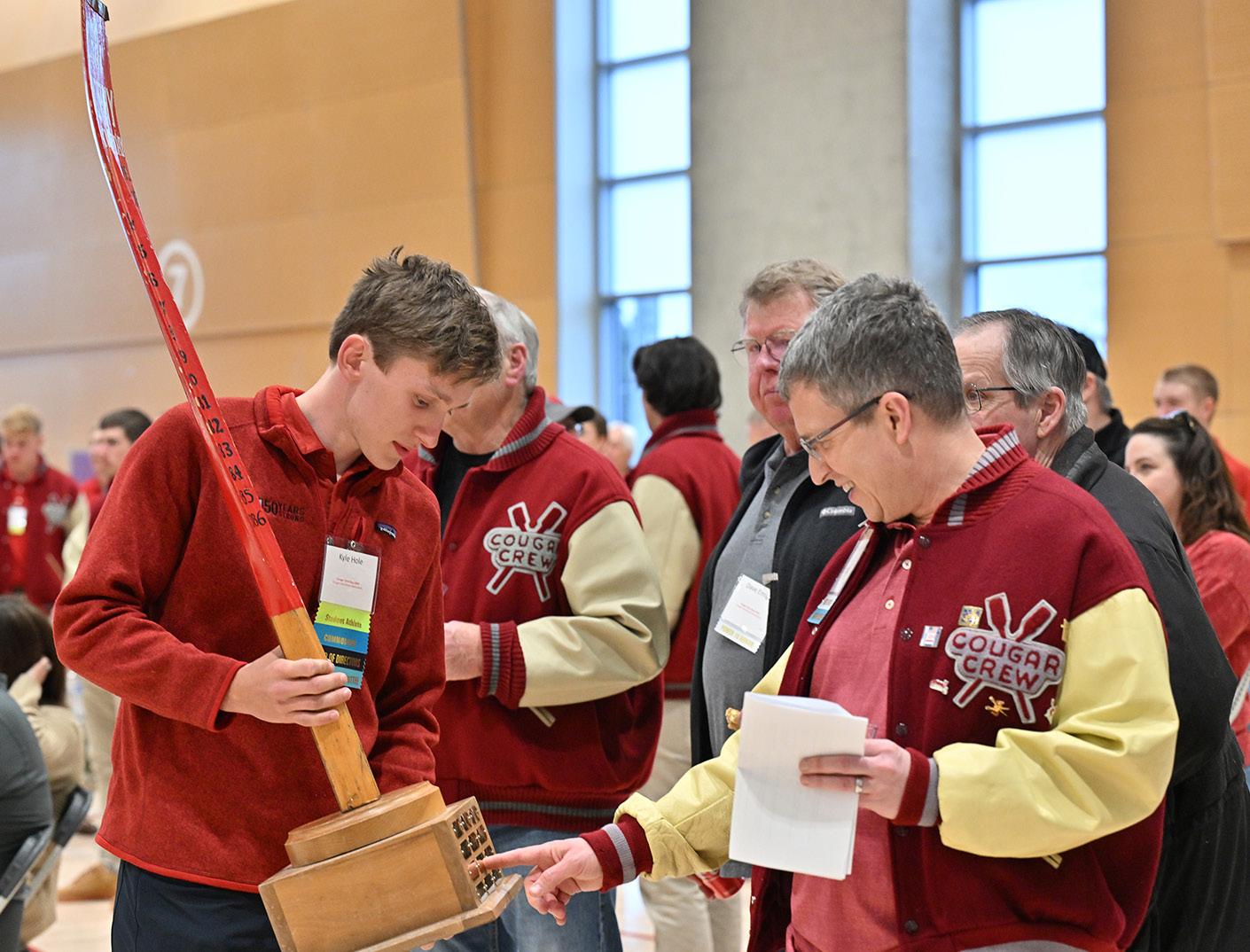
They won as Freshmen, Sophomores, Juniors and now Seniors. Has any prior cohort duplicated this feat?
Below: In the quality corner: longtime Coach Ken Struckmeyer, Head Coach and Program Director Peter Brevick and Marj Crew Mom Struckmeyer share a quiet moment at the banquet.
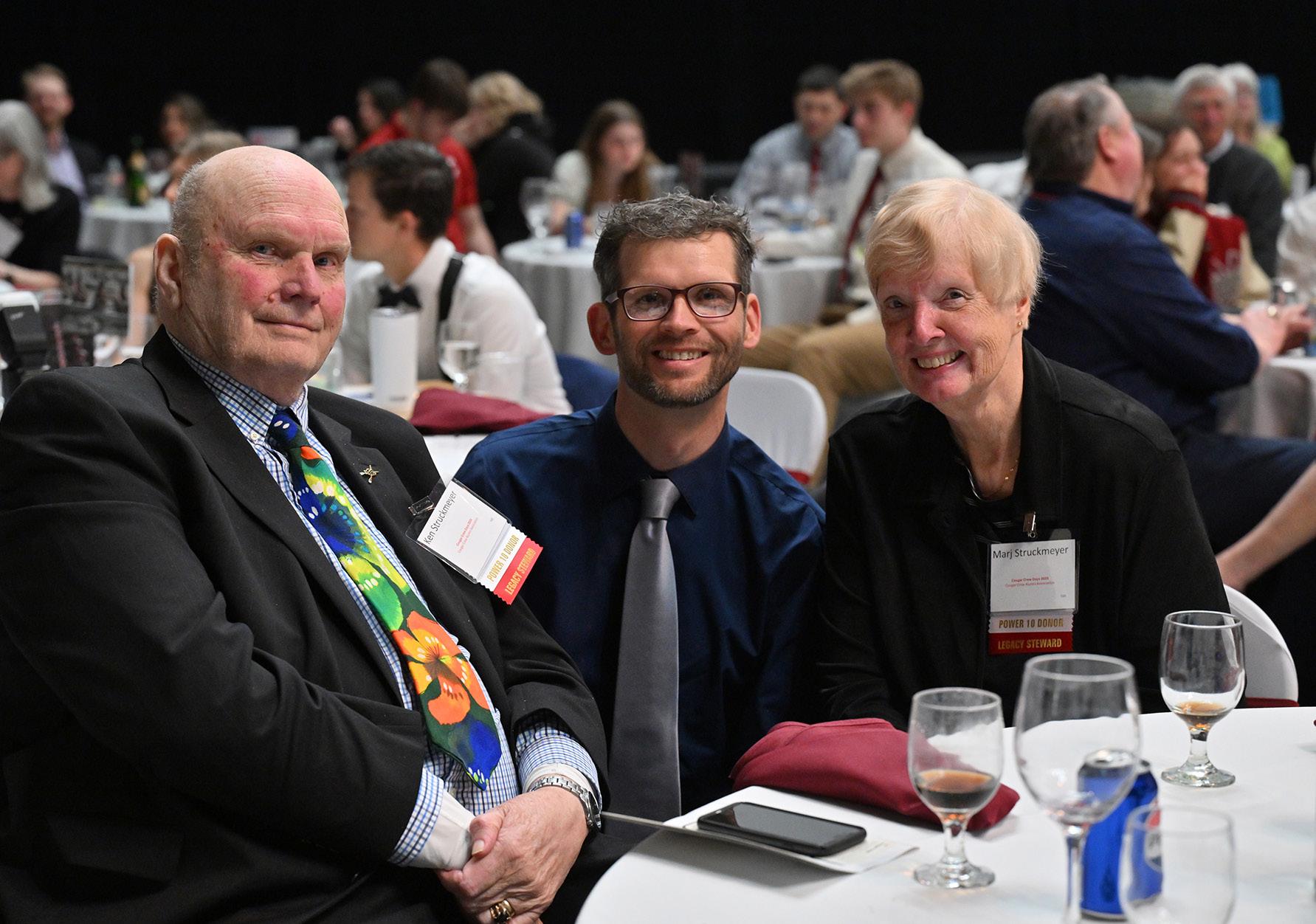
Orr trophy winners: Commodore Kyle Hole (25) skippers the distinguished honor roll of Class Day winners as Roger Holcombe (97) finds the inscription for his Junior/Senior eight. The class of 2025 were again winners.
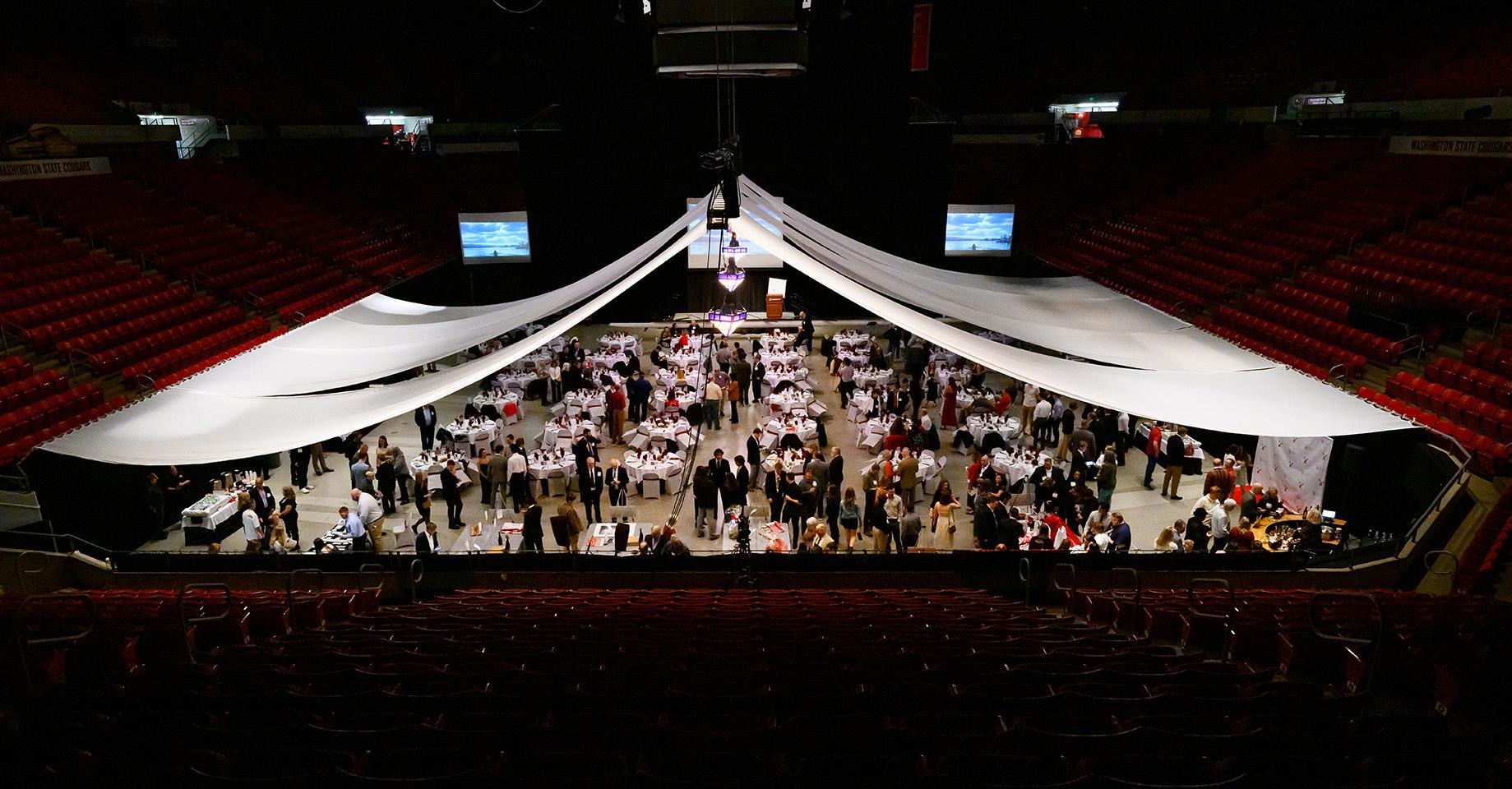
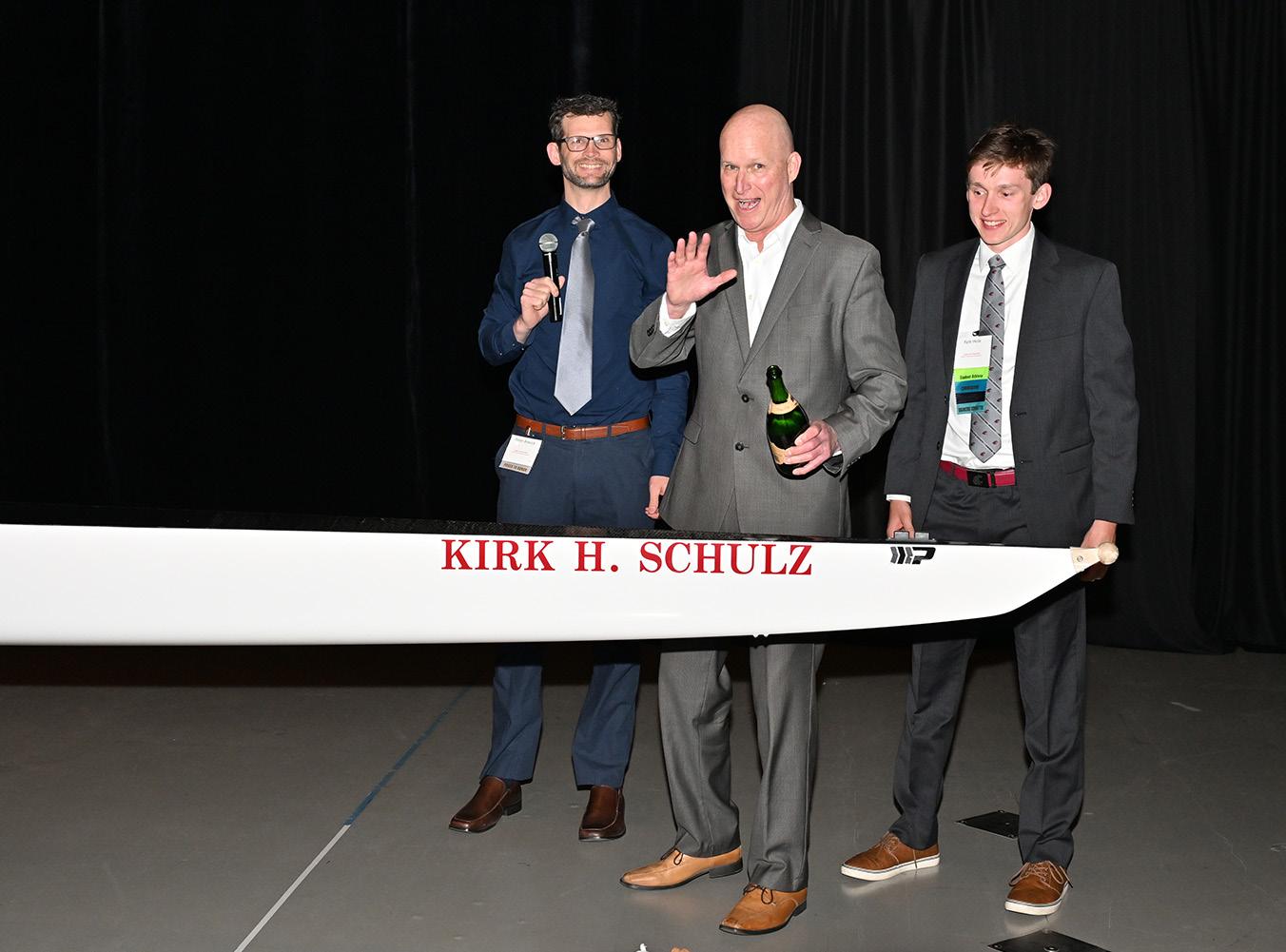
Calm before the storm: the floor of Beasley Coliseum, dressed up in banquet tables and linens, sets the stage for the 2025 Cougar Crew Days Banquet and Auction. Nearly 280 attended the event.
Schulz dedication and seat auction: a racing eight was named to honor retiring WSU President Kirk H. Schulz. For nearly a decade, Schulz directed discretionary funds to cover benefits for coaching compensation packages. Coach Brevick and Commodore Kyle Hole assist Global Campus Chancellor Dave Cillay, seen here milliseconds before that crucial splash of the bubbly.
The dedication was followed by a Seat Auction. Winners’ names and a quote of their choice to be inscribed inside the gunwale next to their seat. Winners, stem to stern: Bow, Tom Caudill (80), Jim Austin (75), Tim Richards (81), Steve Huhta (73), Bob Nehring (88), Ken Struckmeyer (Wisco 68), Mark Walker-Rittgers (23), Stroke, Alice Iseminger. Cox’ns seat included bidding by teams. Team Shack Attack gifted naming rights to Al Horshack Fisher (79), coxswain of the 1979 IRA Meatwagon 4+.
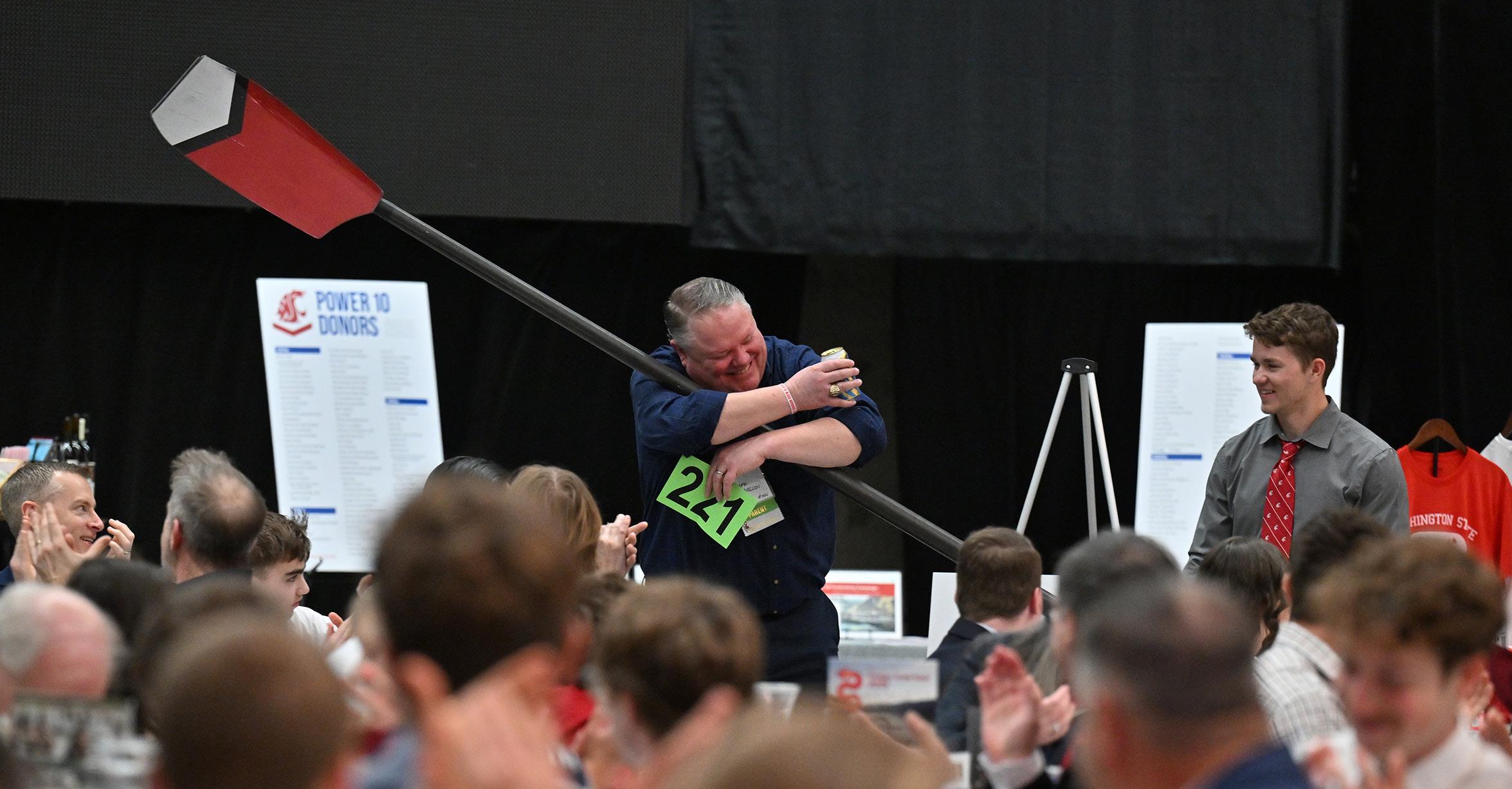
Showing some love: high bidder Jeff Aselin cradles his newly-won, gently-used, hatchet blade. A perennial bestseller on the annual auction catalog, the two sweep oars donated by the team were as popular, even beloved, as ever.
more on page 14
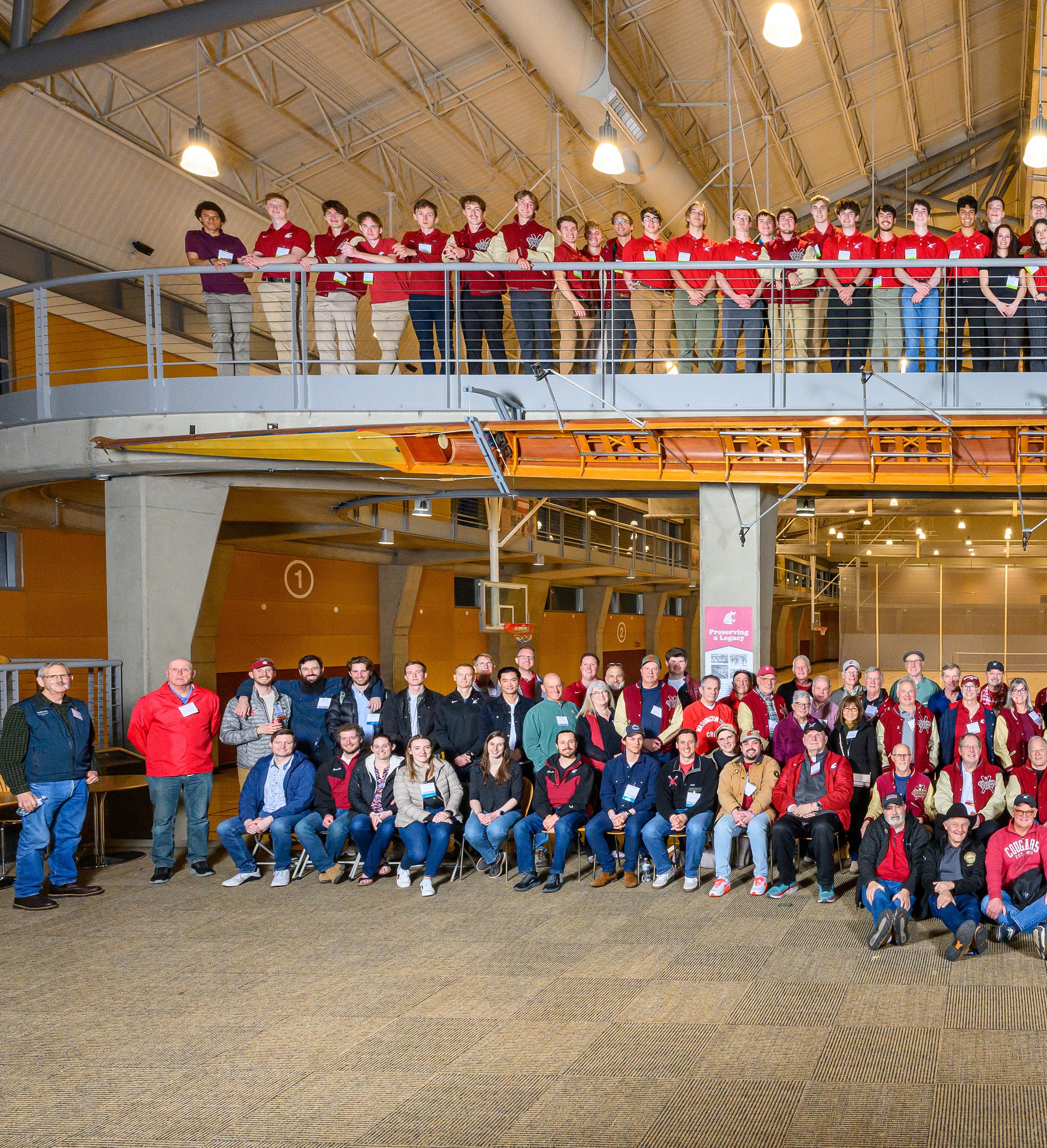
Tradition, tradition! The first Ice Breaker group shot, taken in 2024, was part of the installation ceremony for the David M Emigh. According to the usual unreliable sources, this year’s crowd enjoyed the experience as much or more than 2024. Organizers advise this lively panorama will be a regular feature of the gathering.

Photo: Dean Hare, WSU Photo Services.
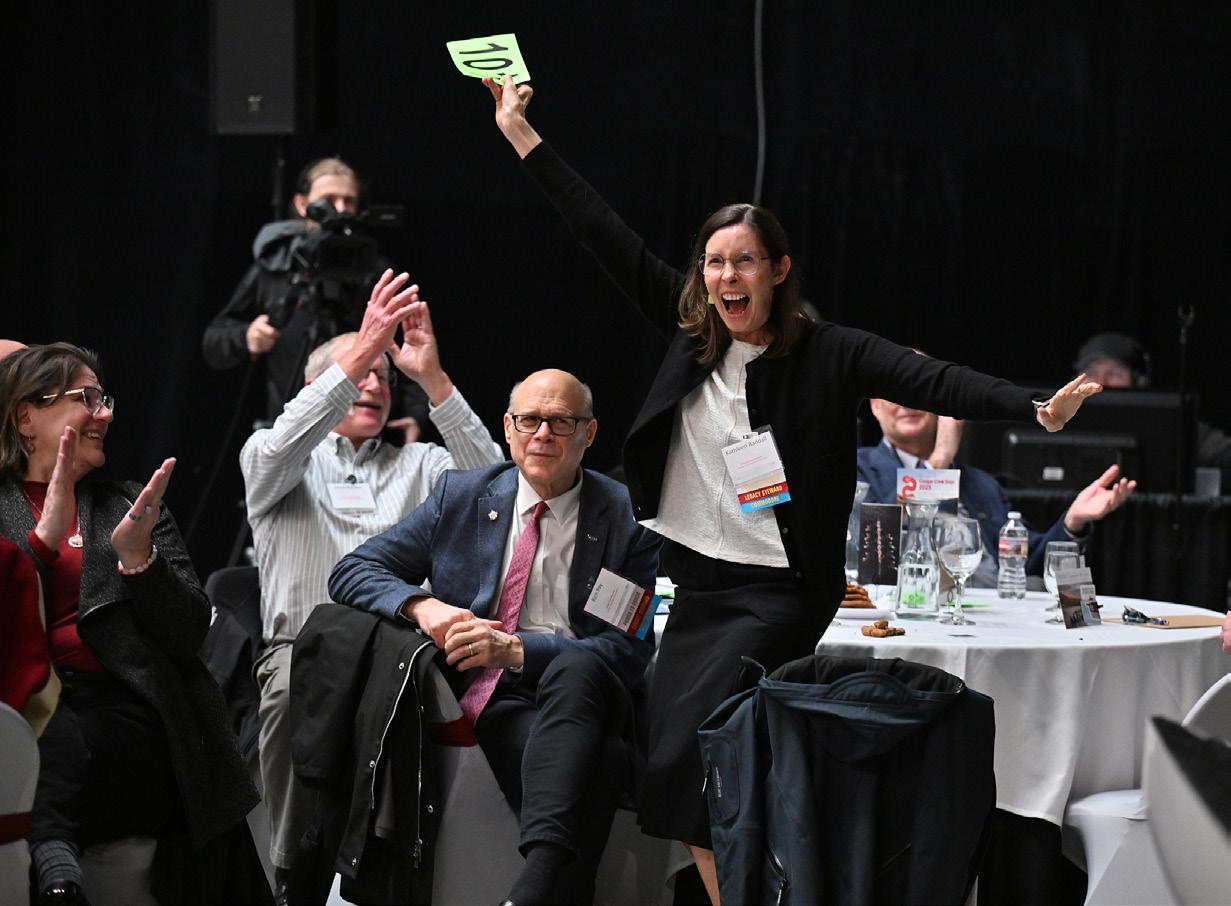
about Hawaii: Kathleen Randall (81), winner of an all-expenses travel package
CCD 2025, more fun
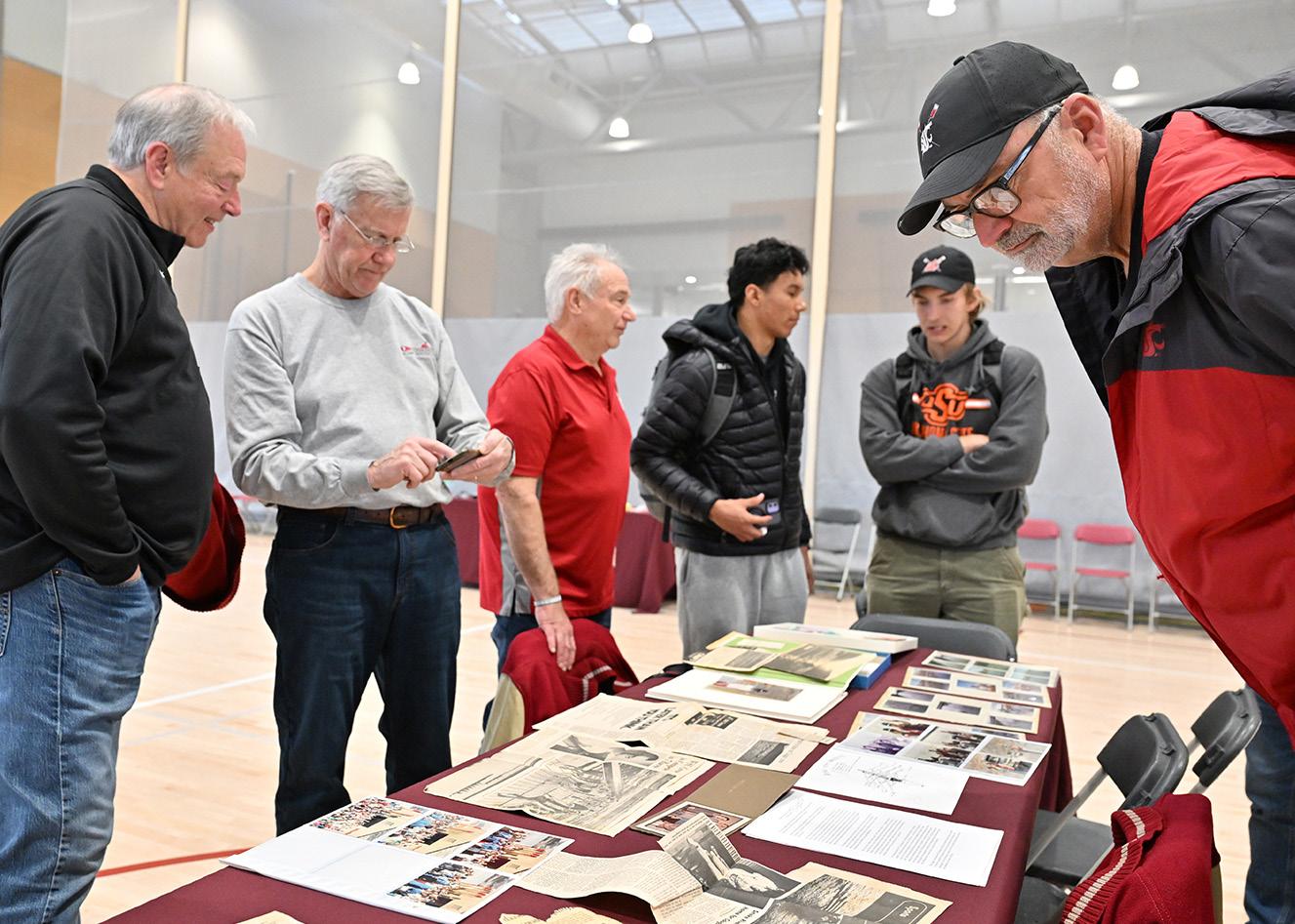
High winds, snow and rain put the kibosh on fun at Wawawai. Back at the Rec Center, coffee, tea, pastries; chatting up old buddies; poring over photos, scrapbooks and memorabilia were welcome alternatives to getting cold and wet.
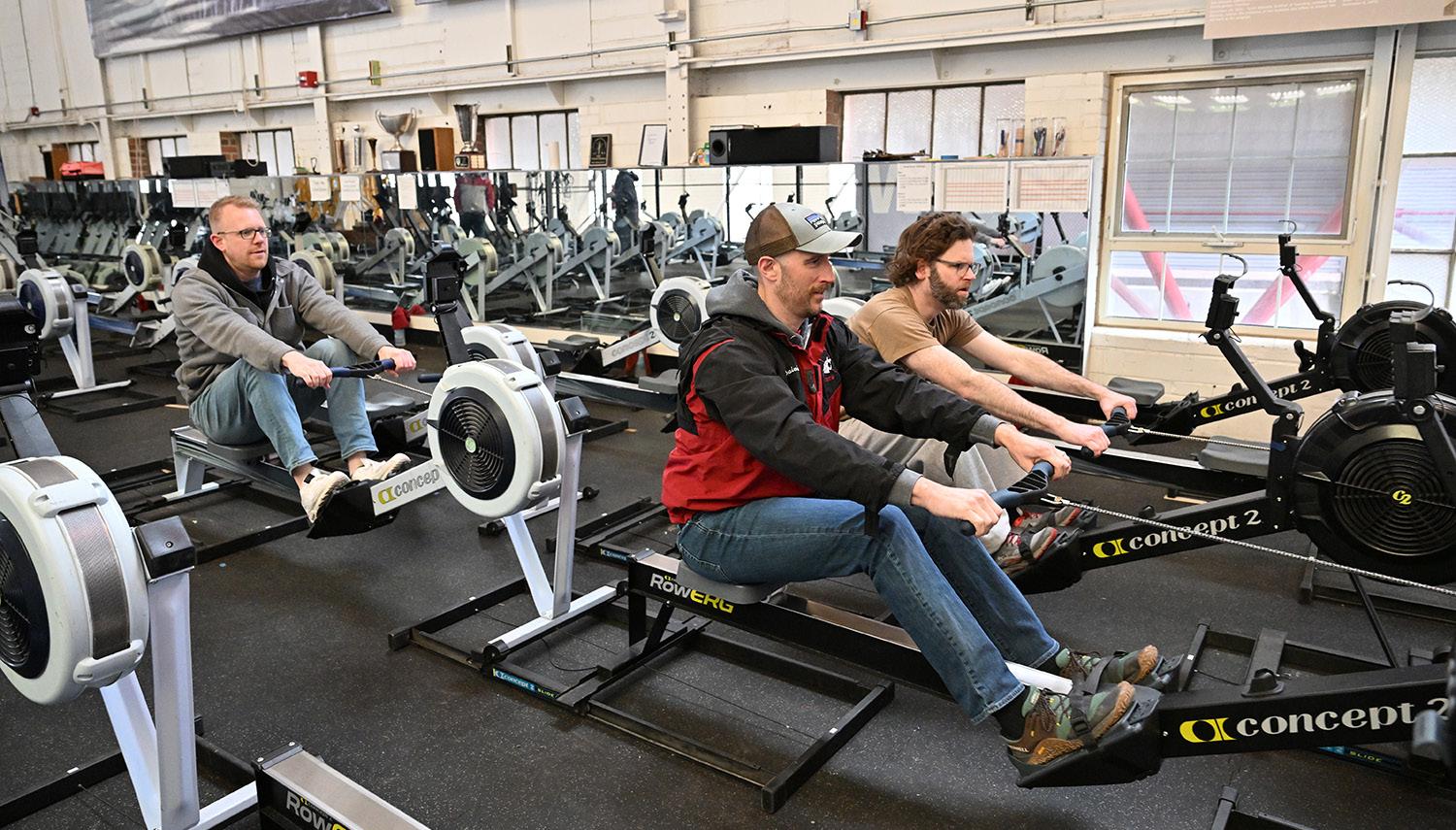
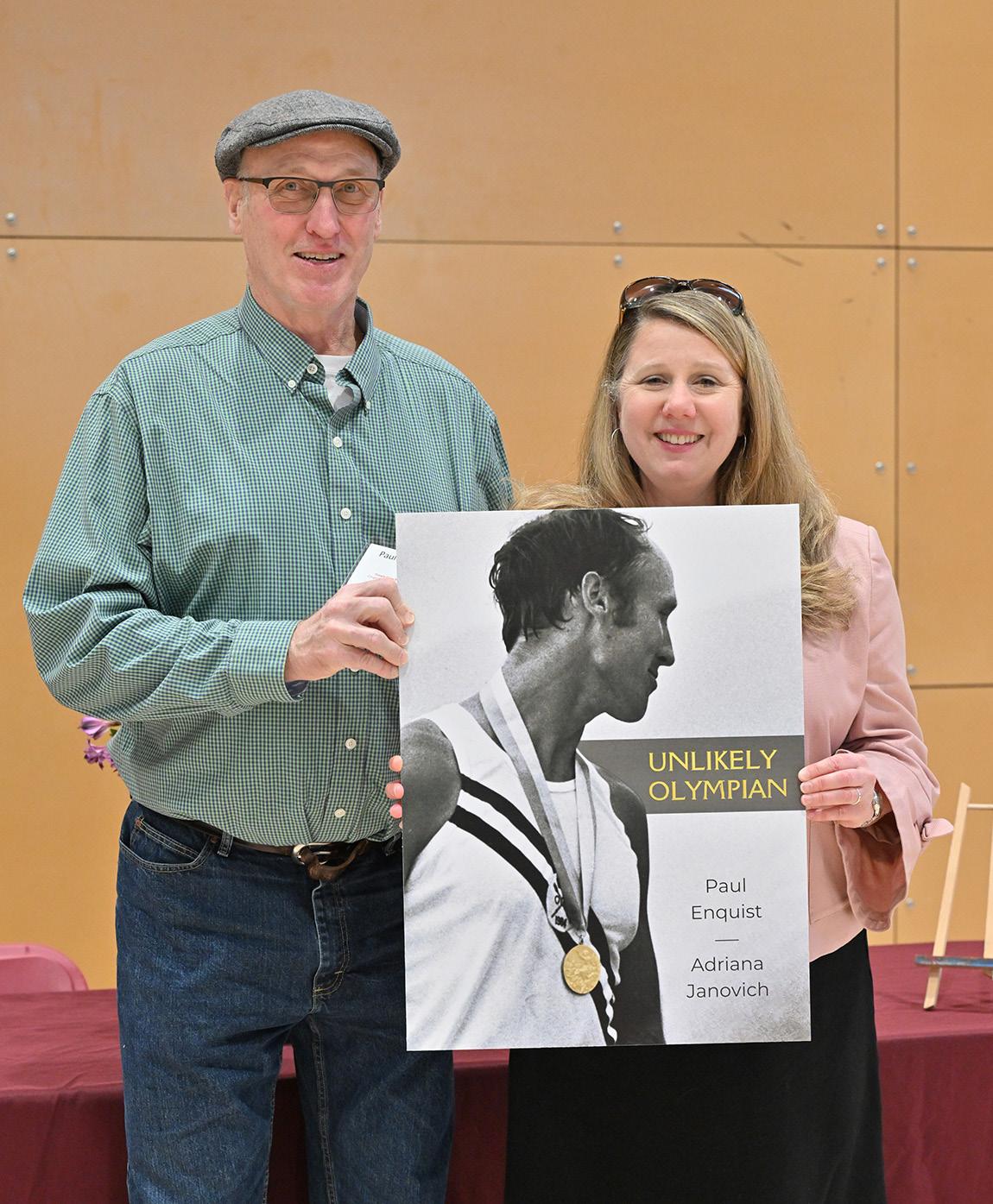
Olympian Paul Enquist (77) is collaborating with Washington State Magazine Associate Editor Adriana Janovich on his rowing biography. Janovich has become a local expert in the program’s history. Publication of Unlikely Olympian to coincide with the 2028 Games in Los Angeles.
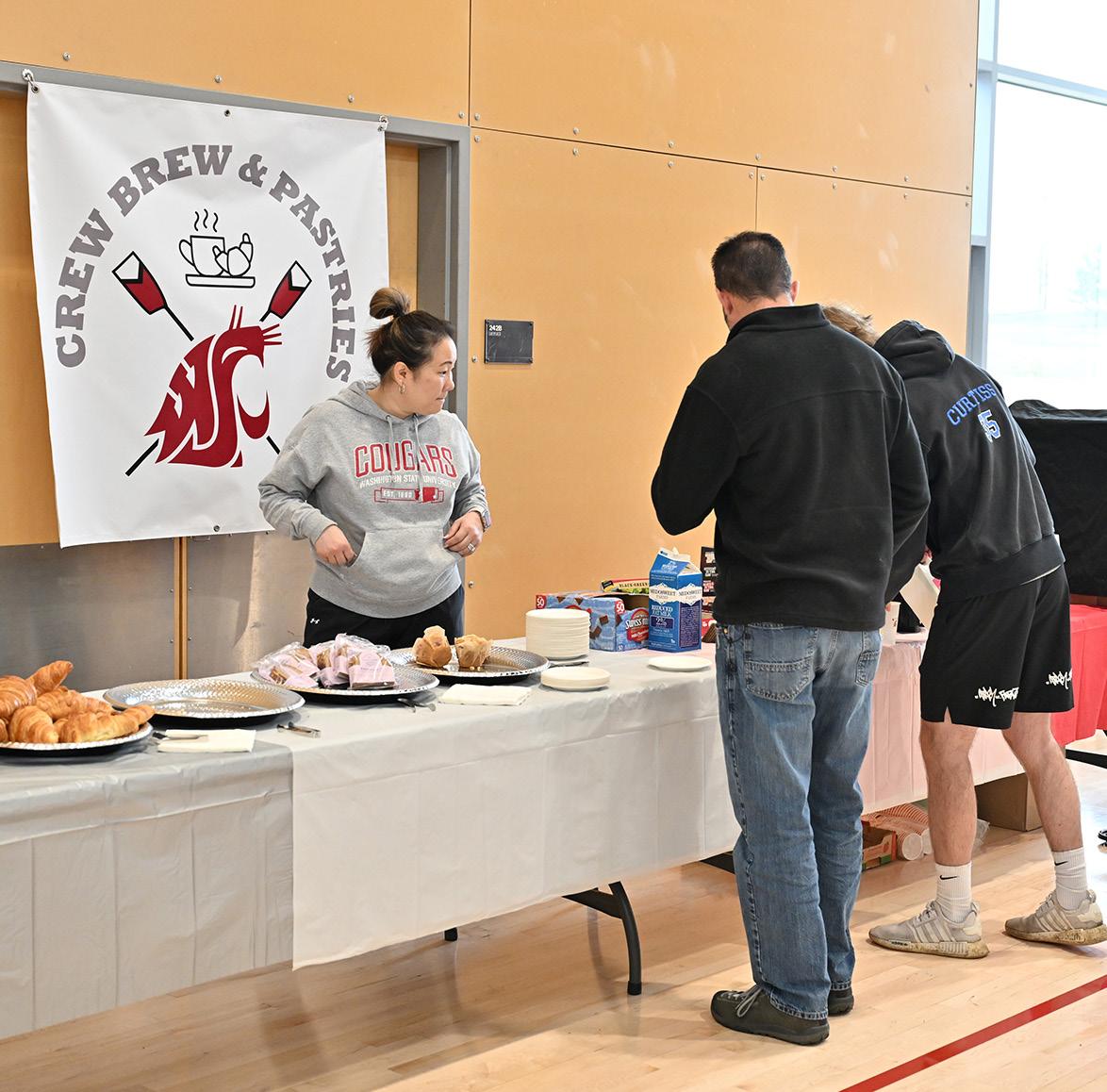
Saturday morning. Sophomore novice oar Alex Law’s mom, Charise Pruitt-Law, tackled the hot drinks and sweet treats at the river problem with eye-popping energy and enthusiasm. Inclement weather diverted her hospitality to the warm and dry confines of the Student Rec Center.
Concept2 in lieu: Many are the ways to get a taste of the old days, including flirting with the exquisite punishments and rewards of the ergometer. CCD25 guests take advantage of the team’s well-equipped erg room located in the Hollingbery Fieldhouse loft.
Happy
to the Mauna Kea Hotel on the big island. This hefty two-prong donation courtesy of Mauna Kea Resorts and Alaska Airlines.
Endowment Goals & Fiscal Year 2024/2025 Review
Annual operating expenses are now approximately $450,000.00. Our biggest outlays are compensation (36%) and transportation to and from practices and regattas (33%). Running a distant third: racing fleet maintenance (18%), followed by a catch-all category including regatta entry fees, helping athletes cover dues, team apparel of all kinds and erg room rental (total: 9%). Finally, a reserve fund for future equipment purchases (4%). Most of our income is from alumni and friends of the crew. A whopping 72% now flows from Cougar Crew Days, Power 10 memberships and miscellaneous donations from that group. The current crew raises 14% via dues, Rent-a-Rower and Row-a-Thons. UREC kicks in 8% and interest from our endowments produces an additional 6%. Club crews everywhere are building endowments to create financial stability for their programs. We were ahead of the trend, starting our first in the 1970s. Our endowments have grown substantially over the last decade and six percent of our budget isn’t chump change. To become self-sustaining, we need closer to $15-20 million. This will produce between six and eight hundred thousand in annual income. Many of our alumni have begun including Cougar Crew in their estate planning. Current endowment pledges are at $6.5 million. With additional alumni endowment pledges and an uninterrupted rate of general support, we can reach self-sustainability. All of us can (and should) carve out a place for the team in our personal financial planning.
—Jim Austin (75)
Jim Austin was Commodore his senior year, practiced dentistry 37 years and retired in 2016. In 1997 he began a second career, ongoing, in commercial real estate development. He currently serves as CCAA vice chair and manages the team’s first year-round off-campus recruiting effort.
Farewell and good speed Coach Elliot
An athlete’s tribute Goodbye from Bjorn
Coach Bjorn Elliot led the 2024-2025 Novice team to an unforgettable season. Success isn’t an accident—it’s built on real work, dedication, and leadership. Coach Bjorn lives these attributes in full. His leadership didn’t just improve the team. He led us to accomplishments not seen in more than a decade. We won the George Washington Invitational. We beat Gonzaga in the Fawley Cup. We placed sixth and eighth at ACRAs.
At the George Washington Invitational in Washington, DC, Bjorn’s impact on our performance was something to behold. Analyzing the strengths and weaknesses of our competition (George Washington, Delaware, Rutgers, Bucknell and Virginia) he created a race plan which we executed well. He began by reminding us we were underdogs, then said this was an advantage, because the opposition didn’t expect much from us. Boat psychology flipped from anxiety and doubt to guarded optimism and quiet confidence. The plan: stay with the competition for the first 1,200 meters, where the course passes under Key Bridge. After the bridge make a move, then again at 200m to go. It’s no exaggeration to say that Bjorn’s commonsense, practical pre-race talk played a major part in the outcome. We won.
Coach Bjorn’s larger impact lies in the way he led and connected with the team. His no-nonsense, we’re all in this together approach built solid squad morale, anchored in an ethos of mutual respect, accountability and hard work. Bjorn showed neither fear nor favor, helping each rower and coxswain by pushing all of us to succeed, both as students and as athletes. He taught us how to handle pressure, swing together as a boat and a team, maintain discipline when nobody is watching. He made us better athletes and stronger people. We will miss him dearly. His influence and legacy will shape this team for years to come.
—Lynda Alvarez, Coxswain (28)
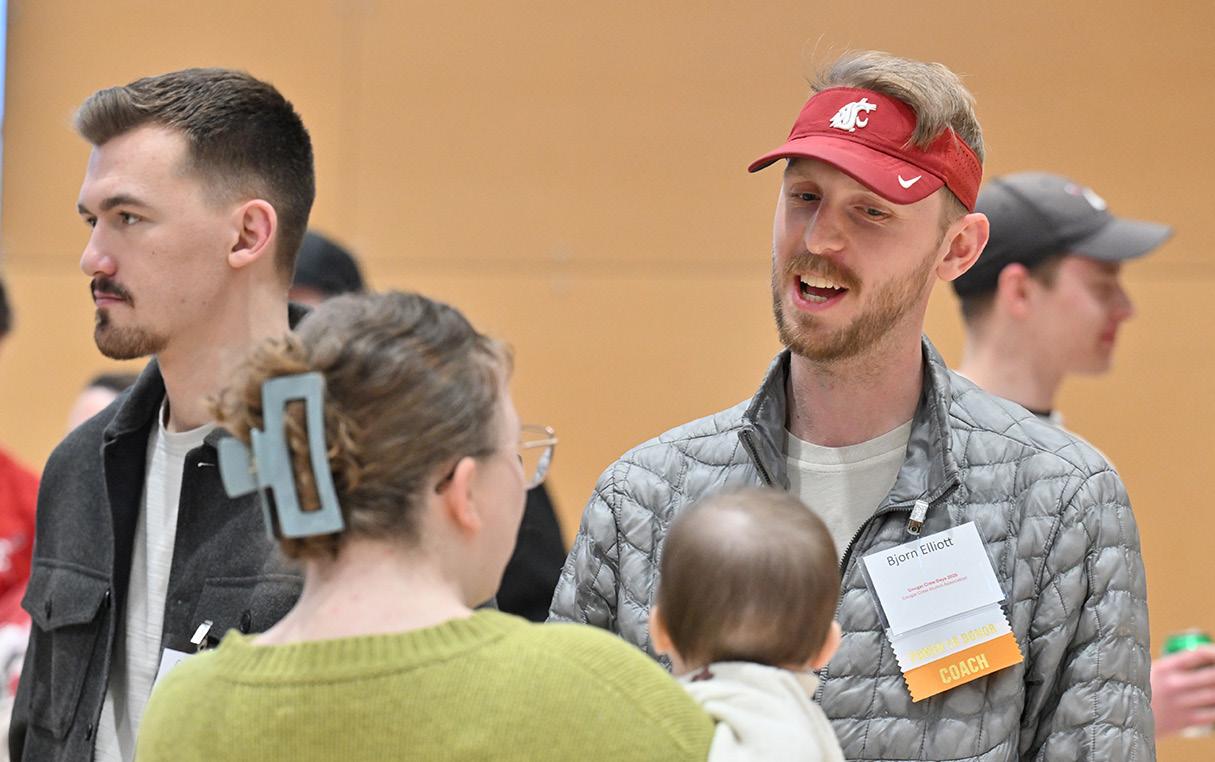
I joined WSU in 2016, part of one of the largest novice classes the team has seen. By the time the season was over we were down to less than eight rowers. We had some of the lowest ACRA finishes the team has seen. Over the four years I rowed, we built the team back. In 2020, those of us who joined in 2016 lost our senior season to the pandemic—a crushing disappointment. At first I thought I was done with the sport. Unexpectedly, Coach Brevick asked me to return to and row at Pac-12s in 2021. In another surprise, he asked me to take a position as volunteer coach after graduation. I had not thought of myself as a coach, or aspired to be one. I accepted anyway, and after a season realized I truly loved the work and decided to pursue it seriously.
I’ve enjoyed the privilege of coaching several successful crews, beginning with the MN4+ B first-place finish at WIRA in my first year coaching. As full time assistant coach, I have helped athletes post some of the best novice ergometer results since I joined the team. This year our M1N8+ defeated Gonzaga, a thrilling end to a long losing streak. At WIRAs, I had the great satisfaction of a strong Novice contribution to the points trophy. At ACRAs, our M1N8+ finished second in the B Final, just 1.5 seconds behind Rutgers. I am grateful to Coach Brevick and the team for giving me a toe in the door for a calling that is both unusually challenging and sometimes fantastically rewarding. I wish the team well in the seasons ahead and look forward to seeing what the athletes I taught and trained on the Snake will accomplish in the contests to come. —Bjorn Elliot (20) Assistant Coach 2023-2025
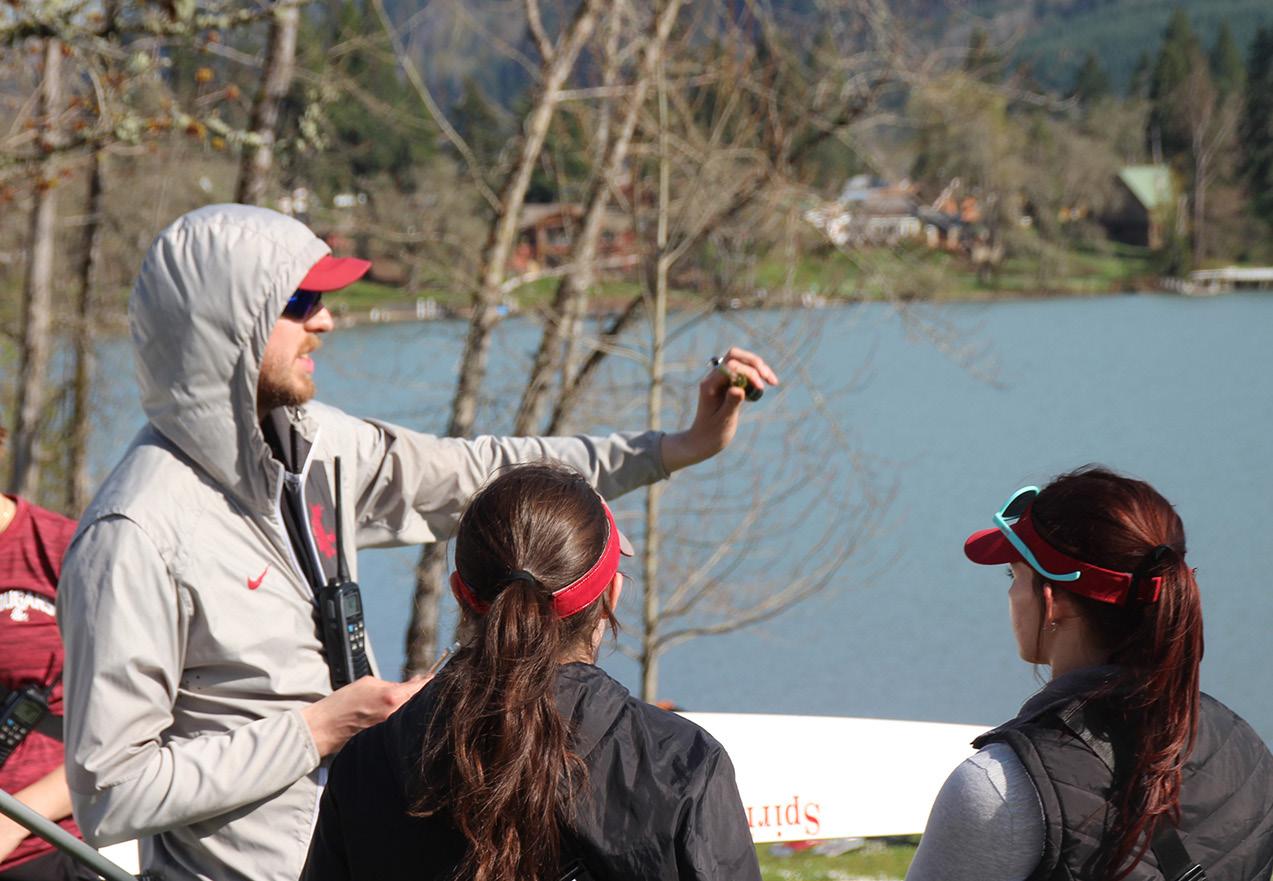
APRIL 5, 2025. L-R: BJORN ELLIOT, MADELINE NEMETH AND AINA BISHOP DISCUSSING THE RACECOURSE, THE WARMUP AND THE RACE PLAN. THE COVERED BRIDGE REGATTA GAVE THESE COXSWAINS THEIR FIRST TASTE OF RACING ON A FULLY-BOUYED 2,000-METER COURSE.
COACH BJORN SIZES UP A POSSIBLE RECRUIT.
Saluting!
The 2025-2026 Officer Corps
Vice Commodore: Chiron Susee (27)

Chiron is a junior in Animal Science PreVet, aiming at a career as a large animal veterinarian. This is his first year as an officer. As a high school athlete, he competed in football, basketball, and soccer. As a novice, he set a new novice 6k erg record for the team (20:40.6) and tied the novice 2k erg record (6:19.2). Chiron plans to sustain Team Rent-a-Rower and expand Personal Rent-a-Rower, which helps individuals cover team dues. Additionally, Chiron wants to help build a team atmosphere and environment conducive to better boat speed and higher finishes at ACRAs.
Recruiting Coordinator: Zackary Brandt (26)
Zackary Brandt will graduate in chemical engineering with a minor in mathematics. He seeks a career in process engineering. A junior-year walk-on, this is Zack’s third season, his first as an officer. In high school, he was football team captain his senior year. He also won state titles in powerlifting. Zack plans to strengthen recruiting with the direct objective of improving team speed.
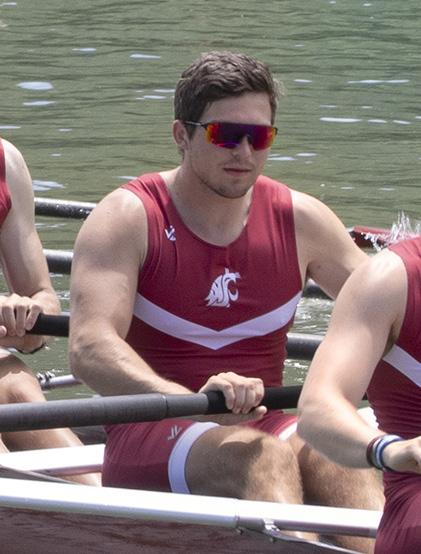
UREC Liaison: Owen Laub (27)
Owen Laub is a junior majoring in business management. He plans to pursue a career in sales or marketing. A freshman year walk-on with soccer experience, Owen picked up rowing quickly. He was Webmaster his sophomore year. As the team’s representative on the Sport Federation Council, Laub will concentrate his efforts on persuading the Council to allocate the funds the crew has requested.
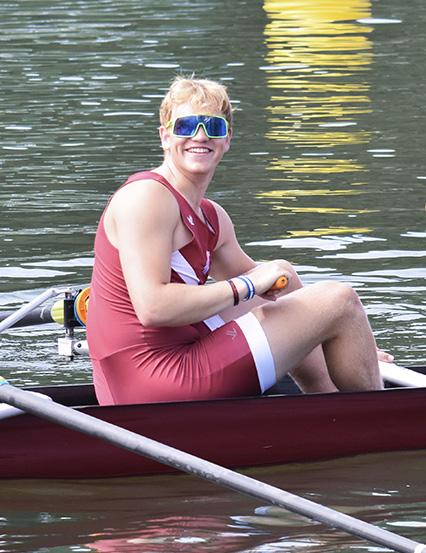
Commodore: Frank Coddington (26)
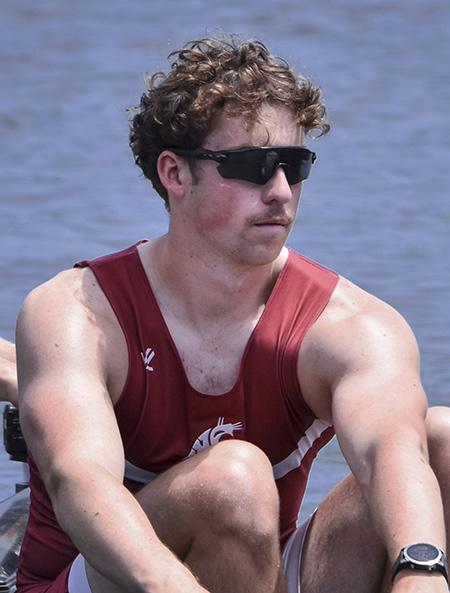
Frank will graduate in Crim J with a minor in Poly Sci and will seek a position with the Whitman County Sheriff or the Pullman Police. This is Frank’s fourth season rowing for WSU. He rowed six-seat in the high-performing 2024 M1V8+. Webmaster as a sophomore, he was treasurer his junior year. His main objectives as Commodore: First, lead the team to another WIRA team points trophy. Second: make sure the club experience generally continues to help develop excellent, successful student athletes.
Treasurer: Dylan Reeves (26)
Dylan Reeves will graduate with a degree in neuroscience and soon be applying for med school. He learned to row in 2019 at Sammamish Rowing Association and raced in the M1V8+ at the San Diego Crew Classic as a senior. He has rowed in the M1V8+ at WSU since his freshman year (2022). Dylan will closely monitor team finances and produce clear, easy-to understand reports to ensure team spending is based on the best information available.
Publisher: Finley Luther (27)
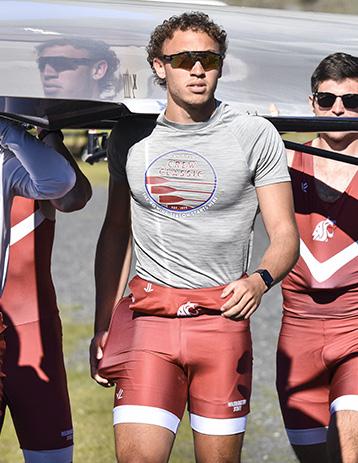
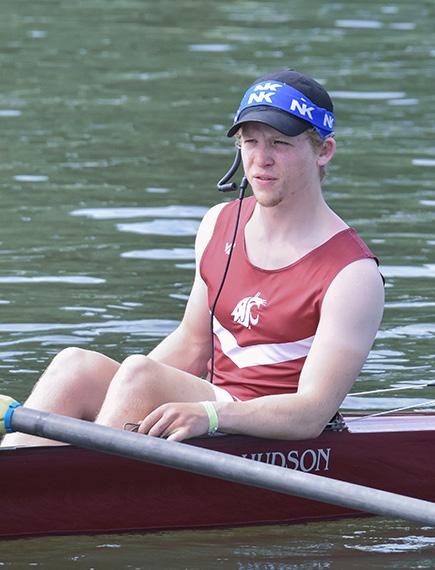
Finley Luther is a junior in kinesiology, anticipating a career in physical therapy or emergency medical services. He is a thirdyear coxswain and a first-year officer. Rowing is Finley’s first formal team sport experience. His primary goal is collecting and organizing high-quality imagery of the team, as well as crisp, factual written summaries of training and events to produce more frequent, regular and compelling social media posts.
Webmaster: Finnley Young (26)
Finnley Young is a junior in Finance and plans to work in wealth management or private equity. A third-year rower and first-year officer, he was encouraged to row by a family member. In high school, Finnley competed in multiple track and field events and was a national top-ten finisher in the decathlon. He plans to draft a calendar of website updates and to improve visual presentation, user-friendliness and general accessibility of all team information.
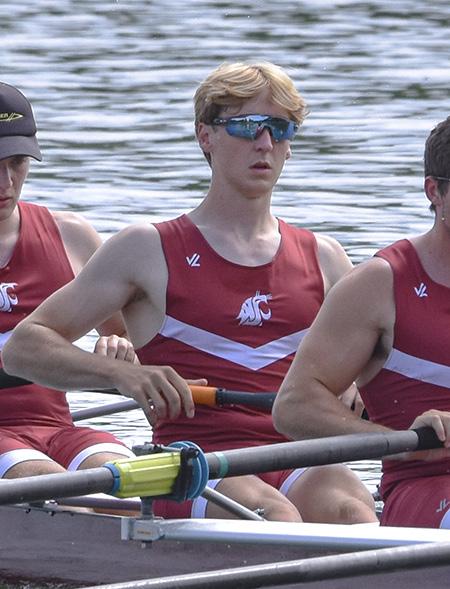
Alumni Notes

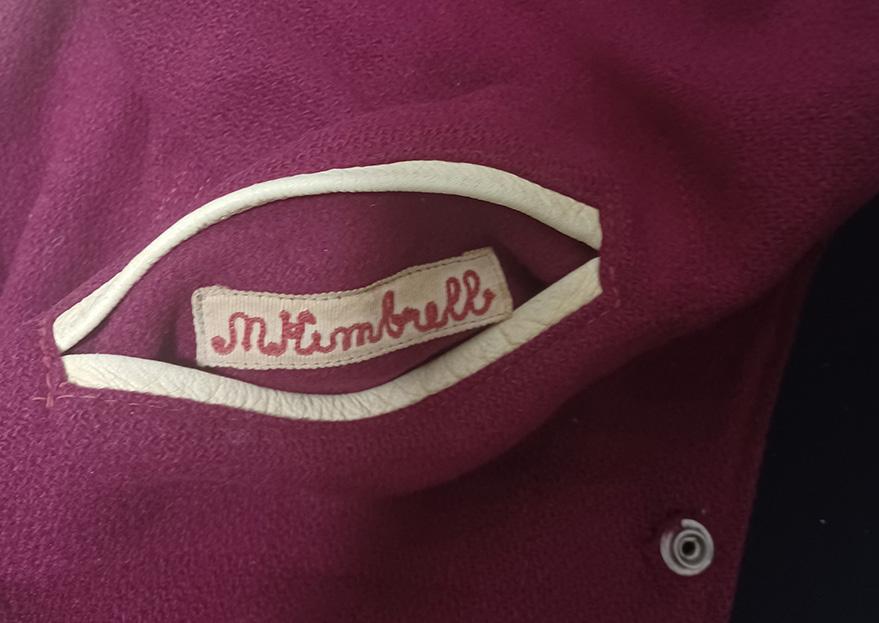
Mike Kimbrell (76) accidentally donated his Lasley Knitting, first generation Varsity Boat Club jacket to charity three years ago while downsizing for a move. Induction into the VBC authorized the new member to purchase a jacket, then about $50. 1972 was the first year of issue. Kimbrell’s sympathetic cox’n kept the faith and recently found a Cougar Crew jacket for sale on ETSY for $150. When the jacket arrived, the original owner’s name, which Lasley monogrammed to the inside right pocket, was… Mike Kimbrell! Mike is probably the only member of the VBC to have purchased his own jacket twice
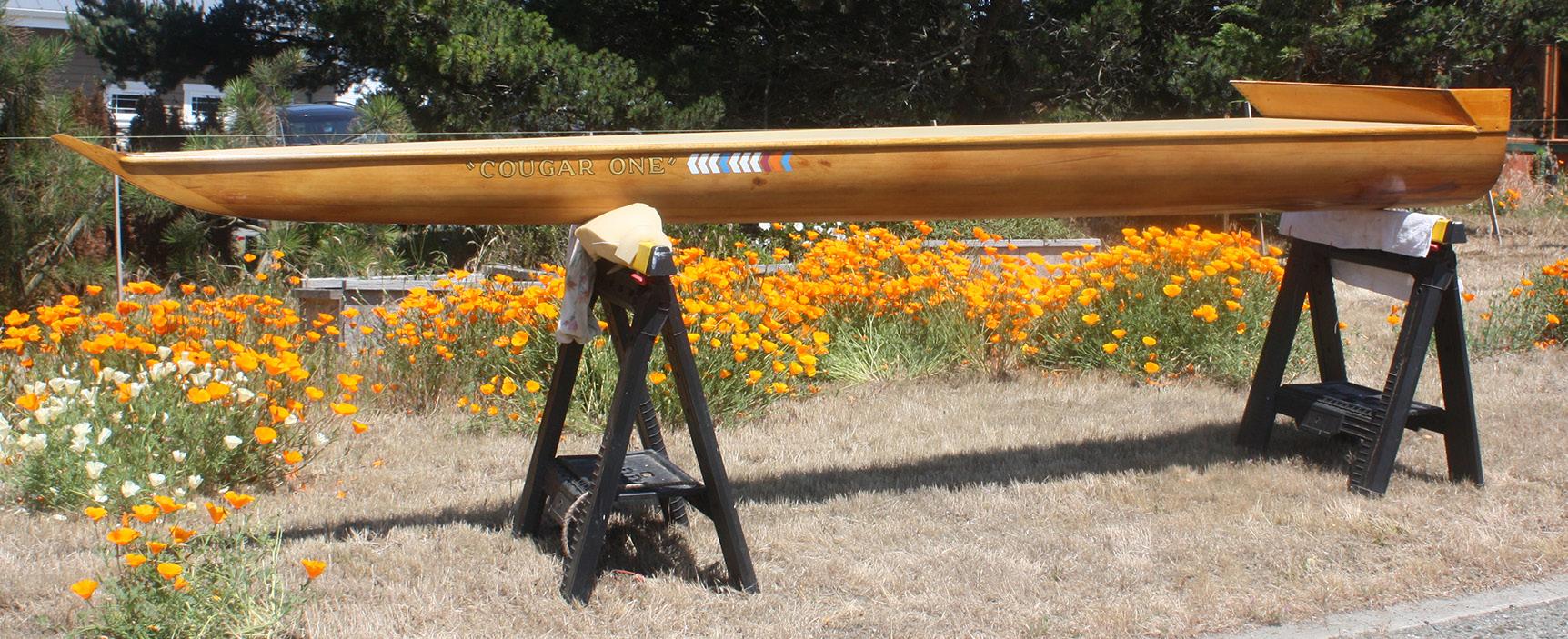
Thanks to crew alumni Mike Klier (75), Jim Rudd (75), Mike Kimbrell (76), Fred Darvill (77) and Brad Sleeper (77), restoration of the bow of the Cougar One, the first shell purchased new by Cougar Crew is complete. This proud testament to the team’s early history will go on display in the CUB August 16 and remain there through December. She will be present at the CCD 2026 Ice Breaker then installed on permanent display in the Chinook Building.
A photo from the personal collection of Mike Kimbrell allowed reproduction of the Pocock font and victory chevrons. The boat name is rendered in 23K gold infill with a black enamel outline. The chevrons were hand-painted. New decking and beading replaced the old decking and aircraft tape, which were not original. A new cut-water tip was grafted onto the original base. Skin and bright-work were top-coated with four layers of UV and scratch-resistant varnish.
Built by Stan Pocock of George Pocock Racing Shells, 1973. Price: $4,200 ($29,700 adjusted for inflation). Livery: David Vane, Port Townsend, WA. Consultant: Roger Payne, Pocock Racing Shells, retired. Chevron color scheme: White = University of Washington; Blue = UCLA; Red = Stanford; Orange = Oregon State University.
Coming to the CUB in August!
Late last year, organizers of the CCAA Wood Boat Project requested temporary exhibit space in the Compton Union Building adequate to display the restored bow of the Cougar One. Instead, we were offered three large galleries for a fivemonth period. Planning and curation has been ongoing since. Installation begins August 11. The exhibit will illuminate the founding of the club; construction, loss and rebuilding of the first shellhouse; the beginnings of the women’s program; lightweight rowing; championship crews; Cougar Crew Olympians; accomplishments of the current crew and questions for the future. Opening is scheduled for Saturday, August 16 as one element of an event welcoming new rowers to the team. The rowing exhibit will remain on view through December 2025.
—Mike Klier (75)
An afternoon 50 years in the making Alumni Notes
In June, Tacoma’s Harbor Lights restaurant hosted a unique Cougar rowing reunion. The interlocking bonds of learning to row on the Snake and trailblazing women’s rowing at WSU electrified the gathering. Talk ran to regattas, running stadium stairs, the Titanic, rowathons, silk screening racing jerseys and more. All remembered formidable challenges and the wonderfully stubborn resilience of the team’s responses.
Two in the group, Andy Moore and Bert Player, were present at the creation: Fall 1974, under French grad student Anne Marie Dousset. Both were on the original roster of nine that made the 1975 season happen. Later recruits at the reunion included Mo Carrick Kelley, Kristi Norelius, Martha Witt Sleeper, Peg Staeheli and Jean Patterson (Fall 1975), Kari Buringrud Ranten (Fall 1976) and Kathleen Randall (Fall 1977, via speakerphone).
Once a Royal City farm girl, Andy Moore’s visit from Hawaii inspired the reunion. Moore: “I had no idea what the hell I was getting into, but Anne Marie was an inspiration. Crew was physical, social, inspirational. Apparently, it still is. We learn about ourselves and find out what we’re made of.” Moore and Player joined crew together and recruited others. Player: “Crew gave me that strong social connection that comes from struggling toward a common goal. Along the way I found lifelong friendships.” Player rowed 19741977 and lives in Elma, WA.
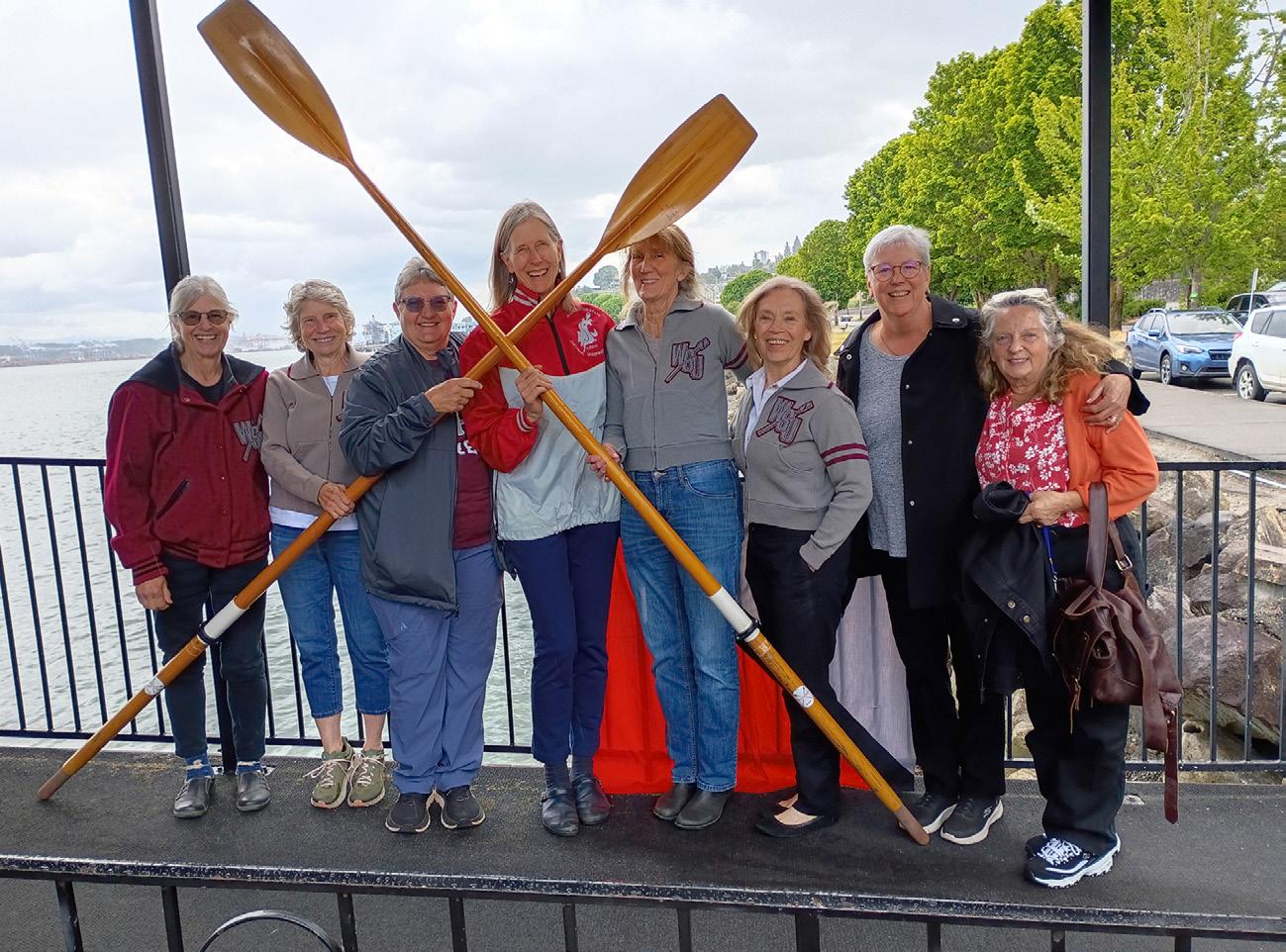
had that opportunity.” She rowed her first two seasons at WSU, 1975-1977, and lives in Olympia.
Coxswain and onboard coach Maureen Mo Carrick Kelley joined crew after time on WSU’s track team. Kelley: “When a stroke collapses over her oar at your feet, you know how much went into that race. It’s beautiful, its devotion, it’s love of testing your limits.” Kelley rowed 1975-1978 and lives in Edmonds, WA. Peg Staeheli: “We were lucky—a mixed group of young women in a sport new to most.” With a laugh, she said she realized she was “banging the gunnels” as she watched Boys in the Boat. Staeheli lives in West Seattle, rowed and coxed 1975-1977.
Martha Witt Sleeper farms in Gaston, Oregon with husband Brad Sleeper, another Cougar Crew alum. Sleeper: “I only rowed two seasons, but rowing has influenced my life ever since. Shared experiences solidified us as a team, but also as friends across the decades.” Sleeper rowed 1975-1977. Kristi Norelius finished in the six seat of the 1984 Olympic gold medal eight. She credits learning to row with discovery of a hidden reserve of inner strength. Norelius: “What we did 50 years ago was life-changing for us all. I honestly don’t know how to express how grateful I am for having
Camaraderie and challenge drew Jean “Snake Action” Patterson to crew. Patterson: “It was hard work, but fun.” Stroke of the Lightweight 4+, Patterson was co-commodore with Norelius 1976-1977. She lives in Lake Forest Park and enjoys travel. She said her Vesper T-shirt is a great conversation-starter and snagged her a row in Melbourne, Australia. Kathleen Randall rowed Lightweight 1977-1980, served as commodore, has loved being on the water since racing Thistle-class sailboats in high school. “I work on the Pull Hard and the Cougar Crew Days because it’s fun and keeps me in touch. The best group of friends I have are from Cougar Crew.” Randall and husband Rich Ray, another Cougar Crew alum, reside in New York.
Before arriving in Pullman, I didn’t know WSU had a rowing team. In the peace and beauty of the Snake I found that great good place and made it my own. I rowed four years and served two as commodore. I learned a lot about myself, gained confidence, found my voice and made lasting relationships. One is my husband, Cougar Crew alum Steve Ranten. It was a privilege and a pleasure to be part of this reunion.
—Kari Buringrud Ranten (80)
L-R: MARTHA WITT SLEEPER (77), PEG STAEHELI (77), ANDY MOORE (77), KRISTI NORELIUS (77), JEAN PATTERSON (78), BERT PLAYER (77), KARI BURINGRUD RANTEN (80) AND MO CARRICK KELLEY (78).
2025 Old Oars Open takes Palouse Ridge by storm Alumni Notes
For two memorable days in mid-June, the second annual Cougar Crew golf gathering, now officially the Old Oars Open, was the main event at Palouse Ridge Golf Course in Pullman. Highlights included tall tales from regattas past, cold beverages and schmoozing, plus leisurely time on the links an astute observer characterized as ‘questionable golf.’ Two rounds over two days meant ample off-course social time. Current crew Frank Coddington, Finley Luther and Cooper Page joined for dinner, reviewing their 2025 season and expressing gratitude for alumni support. Dave Yorozu: “…this was more than golf. It was a chance to get to know people who were, maybe, just a familiar face...and it also made clear that rowing experience does not equate to good golf.” Dave repurposed an old softball trophy, which he has donated to the cause. The Old Oars Open trophy will be presented by The Captain (Ken Struckmeyer) “to whomever he wants” each year. This year, the coveted prize went to Steve Ranten, a Buffalo Boat stalwart and Instigator-in-Chief behind what seems poised to become an important annual event on the Pullman golf calendar. Said Ken: “Two days of wonderful stories and questionable golf! I appreciate the kids coming back and I am thankful the experiences shared were so meaningful.”

Future Old Oars Opens are set for the second Tuesday and Wednesday of June in Pullman. Interested in playing June 9 and 10, 2026? Email Steve at ranten@comcast.net by May 15, 2026.
Pull Hard Look Back: 1983
A Word from Struckmeyer:
It is very gratifying to see alumni and friends become active in the direction of the program. It has been a pleasure to read the latest Pull Hards. Congratulations to the editors and the staff of the new editions.
Several years ago, I overheard a conversation about the losses of WSU in all sports. Someone quoted the Cougar saying: “Wait until next year!” Perhaps this is an indicator of the quality of WSU supporters; we always back the team and look forward with hopes and expectations. I think it is important to remember the crew expresses something the founders worked hard to achieve: the team has class.
We had a good year this past season; we had all hoped for and expected better. If you saw the athletes’ desire and dedication, you
would be proud. I remind everyone that an emphasis remains on academics. We work hard on the athletic side and we do the best we can. But we do not let athletics overpower academics. Recently there was an Athletic Department workshop titled “Life After Athletics.” Our concept is “Athletics After Life,” and rightly so.
The freshmen at the Pac-10 raced in the Cougar One. They lost to California. Afterwards, we weighed the boats. Cal’s was 270 pounds, the One was 326 pounds. California was very good. We also were very good. The nagging question is: What difference did the equipment make, if any? Many of you have said: When I get rich, I’ll buy a boat. I don’t think any of the alumni are rich enough to buy a boat yet—but please consider becoming involved in some way. Nothing would make me happier than if the program were self-sufficient and prospering. To all, our heartiest congratulations, well done, and we think of you and wish you all well.
Ken and Marj
Published in the Summer 1983 Pull Hard. Edited for length.
FROM LEFT: MITCH VAN WORMER (81), CHRIS GULICK (79), JOHN KRAUSE (80), MIKE PABISZ (81), DOUG ENGLE (79), KEN STRUCKMEYER (WISCONSIN 68), ERNIE ISEMINGER (88), JIM AUSTIN (75), PHIL SPRUTE (81), PAUL ENQUIST (77), STEVE RANTEN (79), DAVE YOROZU (77), PETER BREVICK (06), AND MIKE BUCKLEY (81).
The unending race
Mike Klier talks with LWRC Olympian Theo Mittet
In 1964, Theo Mittet earned a bronze medal at the Tokyo Olympics rowing bow in the US straight four. At the time of this conversation (August 2024), he was the sole surviving member of that boat. Theo was dying of cancer when he gave this interview, his concluding assessment of the influence of rowing on the totality of his life, captured with clarity and honesty. Theo died peacefully at his home in West Seattle in December. —MK
PH: How did you become involved in rowing?
TM: I turned out for football in High School but wasn’t aggressive enough to make the squad. My father had rowed at the University of Washington and I was encouraged to take up rowing. The Green Lake Crew was a city-wide rowing program sponsored by the Seattle Parks Department. I turned out in my sophomore year and, thanks to John Halberg, the amazing coach that mentored me, encouraged me and nurtured me, I became a good rower before going to university.
PH: Stan Pocock was the coach of your LWRC 4-. That undefeated boat was widely predicted as the Olympic gold-medal winner. Your boat was third by a length. How did you come to terms with that?
TM: Our Lake Washington Rowing Club coxless four was fast, smooth and had never lost a race. However, a tragedy at the semi-finals changed all of that. We were enjoying an easy lead when suddenly, almost halfway down the course, our three man, Phil Dubrow, started vomiting blood over the shoulder of stroke Ted Nash. Our boat stopped dead in the water as the pack rowed by. We started and stopped, but miraculously won second place which qualified us for the Repechage (a second chance) to win a seat in the finals.
Phil was rushed off to the emergency room where it was determined that he could not row due to a ruptured lung. We now had to replace Phil with the Harvard alternate, Geoff Pickard. Geoff had been the Harvard Stroke and was strong, but all of his Harvard training had taught him a completely different rowing style which didn’t sync with Stan Pocock’s Lake Washington Rowing Club model. Our four was not the same with Geoff. It was not in harmony and it no longer felt light or smooth.
Against most odds, we won the Repechage and advanced to the Finals. The Finals were difficult with a head wind in our lane and the great loss of Dubrow. We were lucky enough to place third for a bronze. There was a palpable feeling of disappointment for not getting the gold that we had earned and a profound feeling of gratitude for not coming in fourth place. Bronze was
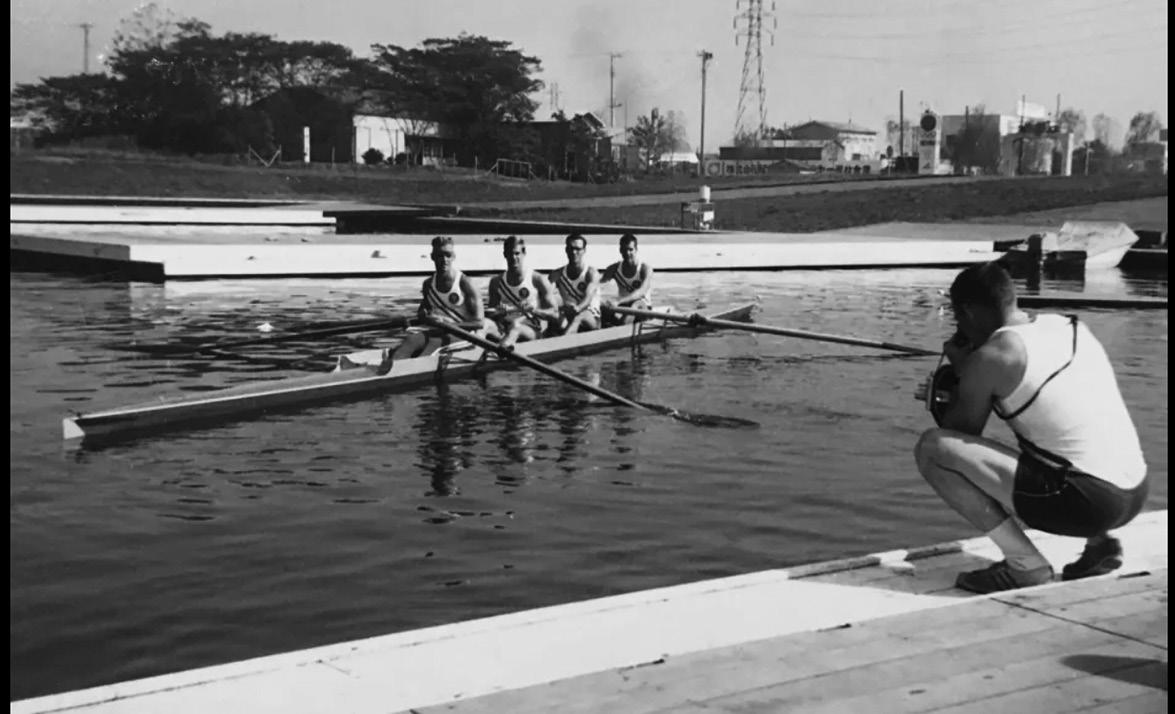
certainly better than no medal at all.
I wake up to this day reliving the smooth, powerful, open water lead we had prior to Phil’s vomiting blood. It had been a moment of perfect and near effortless execution which was lost less than a thousand meters down the course. I would have to say that the moments before Phil vomited blood was as fast, long and smooth as we had ever experienced in a race. It was a transcendental moment which exceeded what I had ever encountered in all of my years of rowing. It was total bliss!
PH: Did winning an Olympic medal impact your life with regard to personal notoriety?
TM: I tended to not mention my medal. It was a very personal achievement for me and I saw no particular reason to let it identify me. But people often introduced me to their friends as an ‘Olympic Medalist.’ This did create a personal notoriety in their eyes. Sadly for me, this was often their takeaway rather than who I was in the other parts of my life.
PH: On one occasion you described a transcendent moment in rowing. Please share that experience again.
TM: There are magical, almost spiritual moments, when rowing brings forth an effortless togetherness. Everything is in harmony, you can feel the bubbles under the keel, your drive is long and smooth, you feel confident and in control and you are listening and responding to what the boat is telling you.
I have a most treasured row that is etched in my memory. It was a two hour mega-row from the Montlake boat house around
THE 1964 US STRAIGHT FOUR LEAVING FOR THE FINALS AT THE TODA ROWING BASIN IN TOKYO. L-R: TED NASH, GEOFF PICARD (ALTERNATE FOR PHIL DUBROW), DICK LYON, THEO MITTET. DUBROW PHOTOGRAPHING HIS TEAMMATES FROM THE DOCK. FROM THE COLLECTION OF THEO MITTET.
Mercer Island and back. The lake was as flat as a mirror just as the sun was rising. Mount Rainier rose tall directly off our stern as the track of our puddles bracketed the tip of its reflection. The only sound was the catch, drive, and release of our stroke cycle. Without speaking, we all knew that we were experiencing a moment of awe.
PH: Did rowing help you in your journey through life? That is, did your experiences of rowing provide models that served you beyond rowing?
TM: The first time that I met George Pocock, as a Freshman University of Washington crew member, he spoke of rowing as a metaphor for living one’s life. That concept took root and I must truly say that if it had not been for rowing and the lessons that it taught me, I would not be who I am today. Rowing taught me teamwork, harmony, togetherness, discipline, strategy and goal setting, loyalty in reciprocal trust to others, and dutiful preparation within the protocols of fair play.
PH: What were your thoughts as you left the awards ceremony?
TM: Elation at having not been fourth place, release from years of training and looking forward to traveling throughout Japan. I was supposed to go to the White House with all of the medal winners to meet with President Johnson, but I opted to stay in Japan to visit Japanese architecture, temples and gardens. I had developed a keen interest in Japanese aesthetics while in architecture school and was able to learn and experience all of the places that I had studied. I also had an interest in Japanese culture. I back-packed and mostly hitch-hiked for three months. It was an amazing opportunity.
PH: There is an enormous difference between a podium finish and fourth. Fourth must be the most difficult result of all. Would you share your thoughts about a fourth place finish?
TM: It is interesting that we only considered doing our best. We knew by the Finals that we were no longer contenders for the gold, but we held out hope for a medal. If we had doubts, we kept them to ourselves. Generally, we talked with a winning attitude. There was little time for Pickard to learn our West Coast style and so that is what we focused on. Thanks to Geoff, we managed to pull ourselves over the finish line for a bronze medal. We were spared the worst outcome for any Olympic event. We were forever grateful for not coming in fourth, which we mockingly referred to as the Black Plastic Award. Did we feel that we deserved the Gold Medal? Yes. But we were elated at not having come in fourth place.
PH: Did winning an Olympic medal impact your life with regard to opportunities?
TM: No, but it gave me a confidence that I had learned through discipline and very hard training. Rowing taught me what I was capable of if I made up my mind to do something. It instilled something deep within me which has proven to be very useful in pursuing other goals and aspirations. In that regard, it impacted my life very favorably.
PH: You moved to Menlo Park in 1965 to train for the World Rowing Championships with the Stanford University Crew. You joined your Olympic teammate Dick Lyon, John Kiely (former Cambridge rower), and Geza Berger in a coxless four. You won the U.S. Trials and proceeded to Lake Bled, Yugoslavia to compete. How did this compare to your Olympic experience?
TM: From the first strokes it became evident that we had a lot of work to do. Whereas the 1964 Olympic four was smooth and together from the beginning, the Stanford boat felt rough. We did a lot more out-of-boat training than for the Olympics, including: running the dreaded graduated incline of the Stanford stadium stairs, racing one another five miles around the stadium track each day, and more weight workouts than I care to remember. By comparison, we were as strong as the 1964 coxless four, but lacked the togetherness, wholeness, and spirit that makes a boat go fast. We fell apart at 1,500 meters. We suffered a fate similar to the Tokyo four due to Geza Berger having a case of dysentery and a 104° temperature during the finals. We took ninth place.
PH: It is often claimed that it is not the destination but the journey that is relevant. Most of us do not distinguish ourselves in rowing. That statement therefore has a tinge of “sour grapes” to it for many of us, at least with regard to competitive rowing. As a distinguished Olympic athlete, how do you view that comment?
TM: My teammate Dick Lyon said, “When you compete as an athlete at the highest levels, even if you don’t come in the winner, you are forced to learn more about who you are deep down.” I agree completely with this. But one must always compete with the destination of winning as the only ambition.
Mike Klier (75) is probably as close as the Pull Hard will ever come to having a staff writer. With a background in Physics and Astronomy, Mike recently retired from a Southern California career in aerospace. He lives almost but not quite off-grid in Ravensdale, WA.
Flotsam & jetsam from the ocean of world literature
—Was your father.... Cranly interrupted himself for an instant, and then said: I don’t want to pry into your family affairs. But was your father what is called well-to-do? I mean, when you were growing up?
—Yes, Stephen said.
—What was he? Cranly asked after a pause. Stephen began to enumerate glibly his father’s attributes.
—A medical student, an oarsman, a tenor, an amateur actor, a shouting politician, a small landlord, a small investor, a drinker, a good fellow, a storyteller, somebody’s secretary, something in a distillery, a taxgatherer, a bankrupt and at present a praiser of his own past.
Cranly laughed, tightening his grip on Stephen’s arm, and said:
—The distillery is damn good.
James Joyce, A Portrait of the Artist as a Young Man
Bob Orr Remembered In Memoriam
Robert Stewart Orr, Jr. was born in Seattle September 6, 1937. He pursued a career in education at the University of Washington (BA, 1961), Seattle University (MA) and WSU (PhD, 1973). The sixteen years Bob invested in getting his PhD included active service in the US Army Reserve. In the Reserves he met fellow Education student, Len Mills. The two became lifelong friends and both pursued doctorates in Education at WSU.
After Bob became the first head coach of rowing at WSU, Len became crew photographer, documenting and promoting the program with classic black and white images. Daughter Heidi was born to Bob and Janet in 1969. Son Robbie was born before the family left Pullman. His long career as educator and administrator in primary ed finished in the public schools of Vancouver, WA, where he retired.
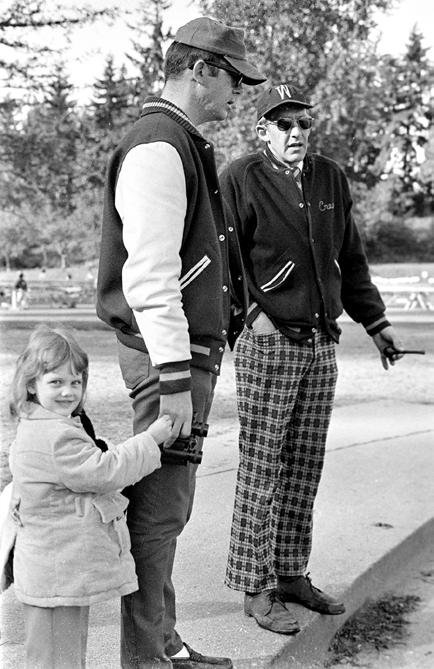
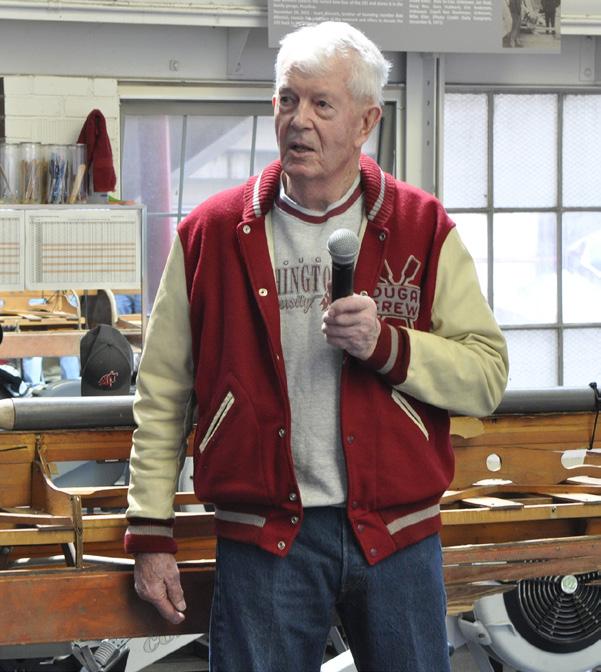
According to Len, his friend was “…a little brash and always an adventurous and humorous soul. He always had some humorous take on most things.” “School was easy for him. He was very bright…” and benefited from an “iron discipline.” For Steve Rowlett (74) Bob “…was a good [rowing] instructor; he was a teacher. That is what he did.” Bob was undaunted by the collapse of our first shellhouse and four hull-losses in the two years he was coach.
Cougar Crew finished 13th out of 17 (behind Holy Names High School of Oakland) in its first regatta, the 1972 Corvallis Invitational. Lacking adequate time to prepare, we came away knowing what winning looked like. Bob knew we needed that insight even though we did not. Our oldest team traditions, twice daily practice during spring break, the Class Day Race, the Varsity Boat Club, the VBC jacket, Commodore-based governance—all originated with Bob and his Husky legacy. He was founder and first editor of The Pull Hard.
In a 2024 interview with the author, Bob recalled:
I didn’t know anything about coaching… I read an article in
the Seattle Times about turning a crew over at Washington State. I’ll go to help. So I went into Ken Abbey’s office. He was Assistant Vice President at that time, and told him I had rowed at Washington, which he had too, and I said ‘I’ll be happy to assist.’ He said ‘Have you ever coached before?’ and I said no. ‘Well, you’re the Coach.’ So that is how that worked. Jim Rudd said to me at the end of that first year, ‘We need some sort of record of what we did.’ OK, I’ll write it up. We’ll have a little newsletter… I didn’t know what the hell to call the thing. I thought Pullman…pull hard…So that first [issue] I called it Pull Hard probably somewhat haphazardly and the darn thing is still going!
Bob Orr died in Vancouver, WA, February 21, 2025. Past tense is traditional in an obituary, but for those who had the privilege of knowing him, Bob Orr is —Mike Klier
Edward “Ed” John Beck
(June 26, 1954–April 9, 2025)
Ed Beck (79) was a Marine. He was a Marine before he came to Pullman. The ethos of the Corps suffused his life—as a student and as an oarsman. Among his peers he is universally admired for his humanity. Ed sought to turn Phi Sigma Kappa into a rowing fraternity and nearly succeeded. Recruiting from the fraternity and from campus, he inspired in others the values he lived: fellowship, generosity, mentorship, the merits of a disciplined, structured life. He not only trained hard, he enjoyed it. As in some sense he needed to; he was marginally and frustratingly heavier than the lightweight limit.
With his MG Midget, Ed hunted the ubiquitous quail and pheasant grown fat along the Almota Road from grain spilled on its way to market, reveling in all but the walk to retrieve the kill. A peerless and imaginative prankster, his exuberance was tempered by a kind and open heart. Ed returned to the Corps following graduation with a degree in Political Science. He retired as a Major.
—Mike Klier
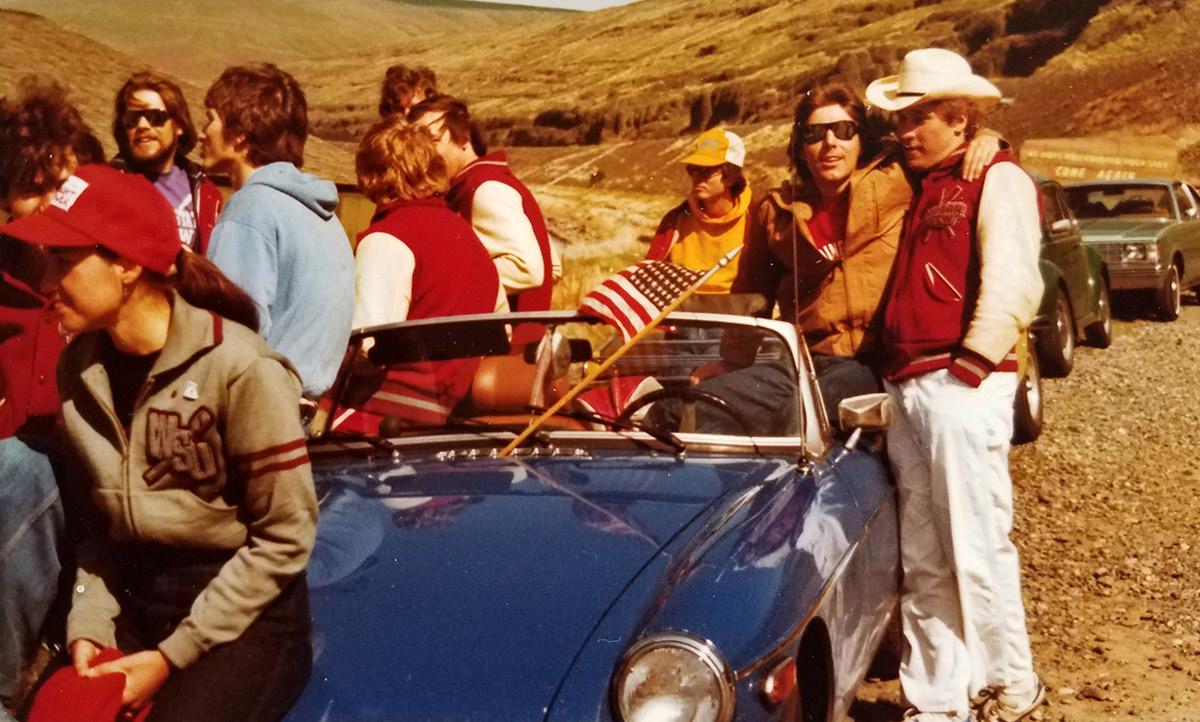
ANY DAY AT ALMOTA, LATE 1970S. L-R: TOM ANDERSON (80), SUSAN ERNSDORFF (80), KURT WAHLE (81), BOB LEX (84), TIM RICHARDS (81), JOHN KRAUSE (80), JOHN DELONG (79), TOM CAUDILL (80) AND ED BECK, IN COWBOY HAT (79).
(L) HEIDI ORR, BOB ORR, AND DICK ERICKSON AT STEWARDS CUP IN 1973. PHOTO: LEN MILLS. (R) COUGAR CREW DAYS 2023, BOB ORR IN THE FIELD HOUSE ERG ROOM AT THE REDEDICATION OF THE 101
Thank You! Fiscal Year 2024-2025 Supporters
The list below reflects the individuals and organizations that contributed in the Fiscal Year ended June 30, 2025.
CRIMSON ($25,000+)
Ernest and Alice Iseminger
GOLD ($10,000 to $25,000)
Anonymous
James and Kim Austin
Steve Huhta
Herbert M. Richards
Alexander Jonathon Weatbrook
PLATINUM ($5,000 to $10,000)
Thomas C. Anderson
Michael and Sandra Buckley
Thomas Caudill
Douglas and Renee Engle
Katie and Michael Marelli
Charise Pruitt-Law
Kathleen Randall and Richard Ray
Everett M. Schneider
Kenneth and Marjorie Struckmeyer
US Charitable Gift Trust
Mark Walker-Rittgers
SILVER ($2,000 to $5,000)
Jeff Aselin
Peter Douglas Brevick
Joe and Diane Dejager
Murray and Dian Etherington
James and Marcia Flynn
Jim Michael Gressard
Roger Lane Holcombe
Robert Brian Nehring
Mark R. Shaber
Raymond and Jean Wittmier
David and Pamela Yorozu
BRONZE ($500 to $2,000)
American Online Giving
Jonathan Walker Ames
Patrick and Colleen Andreotti
Anonymous
David and Moira Atherton
Robert and Lynn Barton
Bryan and Jodi Beardsley
Griffin Edward Berger
Marie Beverly
Ronald Joseph Bishop
August Theodore Boyle
Sybil Boyter
Brian and Bridget Campbell
Darrin and Lisa Clark
Margaret Ann Coddington
Robert Paul Cote
Roger and Tammy Crawford
David and Debra Curran
Dan Curtiss
Jason and Meralee Davis
Andria Lyn Day
John and Shirley Delong
David and Gillian Emigh
Paul and Lisa Enquist
Nicholas Lee Estvold
Andy Ferguson
James Ferrell
John Patrick Fiske
Patrick and Marsha Freeny
Stanley and Debra Geddes
Chris and Linda Gulick
Marietta O’Byrne Hall
Crystal Hanson
David and Joanne Harkonen
Ryan James Herrington
Charles and Anne Hole
Karl Daniel Gage Huhta
Ryan and Sarah Hui
Paul and Tiffany Hutteball-Wilcox
Ron and Tracy Iseminger
Charles and Anne Jozaitis-Hole
Tamee Renae Kautt
Willem and Marie Koole
John and Susan Krause
Patrick W. Kvietkus
Michael Lane
Jeffrey and Karen Laub
Douglas and Carol Lindahl
David and Tammy Lindberg
Paul Andreas Soules Lund
Rebecca C. MacLean
Timothy John Malkow
Guy Albert Marden
Michael J. Marelli
Doug and Kristie McBride
Kenton and Rocio McCleary
Kerin Diane McKellar
Brett and Alison Mitchell
Fred and Linda Muehlbauer
Julie Muirhead
Paul Nelson Needham
Michael and Valerie Noble
Scott and Sally Nowak
Jess and Victoria O’Dell
Alfred and Carol O’Dell
Robert and Jeana Obom
Lucas Jerome Olona
Jason and Lisa Page
Steve and Kari Ranten
James and Vicky Rudd
Andrew and Tracy Sawyer
Steven Shapiro
Shell Oil Company Foundation
Richard and Elois Stager
Joseph and Frankie Tennison
Lisa M. Thornton
Alexander Damien Van Rijn
Mitch R. Van Wormer
Norman and Rosemary Vigre
Colby and Kori Voorhees
Brandon Michael Vukelich
Pamela Ware
Erron and Jennifer Williams
Mitchell Victor and Kim Williams
Craig and Sherrill Williamson
GRAY (up to $500)
Blackbaud Giving Fund
Brianne Able
Jurgen W. Achterbosch
Taylor Adrian
Alarid
Michael F. Allen
Connie Almaraz
Michael and Rebecca Anderson
Lidia Anderson
Bekie Anderson
Tomas Rojo Angeles
Robert and Christine Appleyard
James Michael Aquino
Jeffrey Ryan Arnevick
David and Arienne Arnold
Denise Arter
Michael James Austin
Lynee Backes
Janeen Backes
Max Backes
Shawn Andrew Bagnall
Jake and Jennie Bailey
Kevin Baird
Joan K. Bakulich
Tracey Baron
Kenneth B. Bartline
Blaine and Susan Beardsley
Randall and Sherry Bell
Joshua Gunnar Benson
Sally Bergfeld
Wyeth James Bernardin
Jessica A. Bettes
Pamela Lee Biallas
Sheldon Buys Birch
Miles Bird
Vanessa Adele Blake
Judith A. Bloom
Sherri Bodman
Ole and Julie Bohman
Meri Adele Bond
Douglas H. Boseck
Anita M. Boseck
Holly Boyter
Mark Boyter
Gary W. Boyter
Saoirse Boyter
Alan Brake
Brenda Branch
Michelle M. Brandt
Sharon Brandt
Daniel Kristofer Brevick
Daniel Brightwood Music LLC
Robin Lynn Brown
Doug and Amy Brown
Alicia K. Brown
Stacey Brucker
Blake Thomas Bryson
Nathan Allan Budke
Harry Busscher
Roland and Stephanie Butcher
Alma Cabatingan
Geraldine Calvez
Karen M. Campbell
Brad Stephen Carlberg
Justin N. Carlo
Marcella Chambless
John D. Christensen
David Cillay
Christina M. Clark
Willard J. Cochran
Jena C. Coffey
Ronald and Teresa Cole
Hayden Taylor Cole
Ronald and Teresa Cole
Roeland and Lori Collet
Steven Taylor Collet
Tami L. Cooley
Marvin R. Cooley
Lisa M. Cooley
Rose G. Corso
Jeffrey D. Corwin
Roland and Stephanie Cox
Allan Criss
Colin Criss
Cedar Miles Cunningham
Craig and Lisa Curtis
Wanda J. Curtiss
Paula L. Curtiss
Victoria Davenport
Jason and Meralee Davis
Paula Davis
Larry and Carole Davis
Heather C. Davis
Edward and Sabine Davis
Eliza Jane Dawson
Eric Rogers Demaris
Karen L. Deyerle
Angela R. Dierdorff
David Dirrdorff
Bonnie Drost
Sarah J. Dunn
Jeffrey R. Earle
Judy Korlene Eekhoff
Rodney and Julie Ehrlich
David Allen Ek
Thomas Michael Eldridge
Matt S. Elliott
Bjorn Blide Elliott
Agnes Engle
Anthony Matthew Enzler
Mary Erickson
Donald and Melinda Ernsdorff
Brian and Jennifer Evans
Mindy Evans
Colby David Farvour
Denise Leigh Fast
Benjamin and Victoria Fields
Dianne Fohn
Michelle Carol Ford
Giuseppe Forte
Tyler Robert Fotheringill
Tanya Fraioli
Patrick and Marsha Freeny
Christine Fremouw
Lisa Fuchs
Katherine L. Garneau
Tim Glen Gattenby
John Thomas Gehring
Brendan M. Glouner
Thomas M. Glouner
David and Maria Gore
Joshua Ronald Gray
Joanne Greene
Leah Paige Grier
Chashawn A. Grogans
Keriann Guthridge
Ronald and Thanne Halsted
Sean R. and Sarah Halsted
David Hammond
Lisa Hanses
Julie Hanson
Barbara Hardt
Jason Hawk
Anthony and Melinda Hensel
Amy Henson
Natalee C. Hernandez
David Todd Herrick
Roger and Barbara Heskett
Ann Kathryn Heskett-Rorie
Joel Hickox
Julie A. Hirsch
Cassie Hodgin
Jeff Hoerth
Mark and Lindsey Hoffman
Eve Boe and John Holtman
Gary and Brenda Hubbard
Daniel E. Hulsey
Luke Lawrence Hunter
Lauren Hutchinson
Amy Hutt
Craig Randle Illman
Elna Iseminger
John Iwanczuk
Steve O. Janich
Adriana M. Janovich
Hana Johnson
Adam Johnson
Suzanne Johnson
Joel and Krista Jones
Lucas Boyd Jones
Scott Jordahl
Patricia J. Jordahl
Ole and Tanya Jorgenson
Andrew T. Jozaitis
Anthony and Marie Jozaitis
Larry and Kathryn Kaatz
Douglas and Patricia Kee
Amanda M. Keith
Allison Marie Keith
Heather Kelley
Ward and Lin Kellog
Don Patrick Kelly
Sharon P. Kelly
Aidan Paul Kennedy
Suzanne Kennedy
Ed Kennedy
Randy Kessler
Kristine Miiko Kimura
Michelle Eileen Kistler
Wanda Koch
Kimberly Koch
Arabella Kohlmeyer
Steve and Christina Kolk
Willem and Marie Koole
Ryan Janis Krastins
Thomas and Diem-Tran Kratzke
Christopher George Kuranko
Elizabeth Kwasnik
John and Bonnie Lafer
Chip Lang
Rebecca Marie Largent
Jane A. Lariviere
Kerman Lau
Diane Lau
Kelly Lau
William Laub
Jeffrey and Karen Laub
Matt and Deborah Laughlin
Angela Law
Elizabeth A. Lawrence
Darrell and Corinne Lee
Adrien A. Lee
Margo S. Lindsay
Douglas E. Loft
Jacob Brian Logar
Gary T. Love
Kimethy Lusk
Garrett Hahn Lyman
Alan A. Mackenzie
William Mark Mackey
Tavish Maclean
Christina Mallory
Oleksandr Maltsev
Teresa L. Manciu
Nicole R. Marchbanks
Sean and Theresa Martin
Ryan Elias Mather-Haaland
Dorothy Matthies
Rick Paul Maurice
Virginia F. McCabe
Ciara Grace McCall
Maura McCann
Erin McClaskie
Emily McClure
Brad S. McFadden
Katherine Anne McMurry
Keegan McMurry
Kay Louise McMurry
Theresa D. McMurry
Michael M. McQuaid
Henry McRae
Diane Medved
Peter and Starla Meighan
Mary Mendez
William Boles Miedema
Lora L. Millet
Carter Andrew Mills
Kareen Mills
Colleen F. Mills
Leonard and Lisa Mills
Daniel Alain Moguel
Stan Montarrbo
Scott and Brenda Morgan
Rodney Brian Mott
Michael Scott Muehlbauer
Dana Muirhead
John Michael Najarian
Brittany Neal
Shawn P. Neary
John Jacob Nelson
Ezekiel Palmer Nelson
Jenelle Nemeth
William G. Nesbitt
Gunnar Joseph Newell
Justin Newman
Richard and Amy Newsome
Takumu Niino
Hugh North
Matthew O’Connor
Tristan and Alicia O’Neil
Jeff and Samantha Olson
Michael and Aidaluz Pabisz
Brian and Christina Parrish
Heather Pereira
David and Amber Perkins
Kate Peterlin
Gayle Peterson
Mark Richard Petrie
Michelle M. Phelps
James H. Phelps
Tracy and Lori Pierson
Heather L. Pigman
Douglas and Sarah Pooler
Grete K. Popowicz
Kristi Popowicz
David Popowicz
Steven and Peggy Porter
Sean William Powers
Joshua Lyle Proctor
Cedric A. Pruitt
Patrick and Mary Pursley
Stanley Glenn Putyrae
Hilda Quinones
Tami Rudnick Rabin
Karl Reeves
Charles Owen Remington
Sharon Rhodes
Brian J. Rose
Maureen Macushla McCormick
Ruard
John William Sanders
Michael Satre
Dinice Leana Scheihing
Susan Jane Schell
Sophia Magdalena Schier-Hanson
Madison L. Schmalz
Elizabeth T. Schmidt
Jennifer Schmidt
Jacob Schmidt
Gabrielle Schmidt
Dawn Schmitt
Shawn Schuler
Anita K. Schuller
Anthony and Siri Shapiro
Michael Vasilivich Sheremet
Linda Shipley
Maureen Short
John David Showalter
Erwin Siedentopf
Kristi Silva
Brooks and Kathy Simpson
Gregg Siu
Lori Skordahl
Michael and Rebecca Slotemaker
Thad and Kathleen Smith
Bradley and Heidi Smith
Grace Smith
Kevin and Kathleen Snekvik
John Darrell Snell
James and Irene Snell
Kimberly Michelle Snell
Janet M. Sorenson
Hector I. Soto Nazario
Gypsy Soul
Jon S. Sparks
Weston Rivers Spivia
Jan L. Spratt
Philip and Pamela Sprute
Ross Stannard
Barbara Stavig
Joseph Stavig
Thomas and Donna Stowe
Joe Michael Sudar
Mary K. Sullivan
Samuel Dean Summerhill
Timothy Edward Susee
Molly E. Susee
Brianna M. Sweet
Deyette Swegle
Sean Geoffrey Swett
Dawn Szewczyk
Michael D. Thies
Grant Thomas
Michael and Diane Thomas
Curtis Raymond Treiber
Anna-maria V. Vag
Susan Van Leuven
Allen and Barbara Vanderwey
Katherine O. Vanzanten
Camille Vaughn
Marianne Vincent
Elaine Olson Vincent
Ashley Anh Vu Butuso
Kramer Jon Wahlberg
Robert Andrew Walston
Kenneth Walter
Judith Walter
Karen Marie Warr
Mark Harris Wascher
Nikki Watson
Alex Johnathon Welch
Stevan and Anita Wells
Andrew John Welsh
Eric and Jeanne Weseman
Ethan West
Tyann Marie Whitworth
Sherrill E. Williamson
Hayden James Wise
Jesse James Wolfe
Greg Woodbridge
Janice Woodcox
Doug and Lori Wordell
David and Tiana Worley
Susan A. Wotring
Andrew Wyeth
Vincent Roman Xaudaro
Sarah Katherine Yatsko
Chris Yatsko
Andrew Yatsko
Robert Yatsko
Barbara Young
Kevin Morley Young
Chris Yuen
Richard S. Zancosky
Shannon Zebrowski
Trevor Steven Zook
Jose Francisco Zuniga
